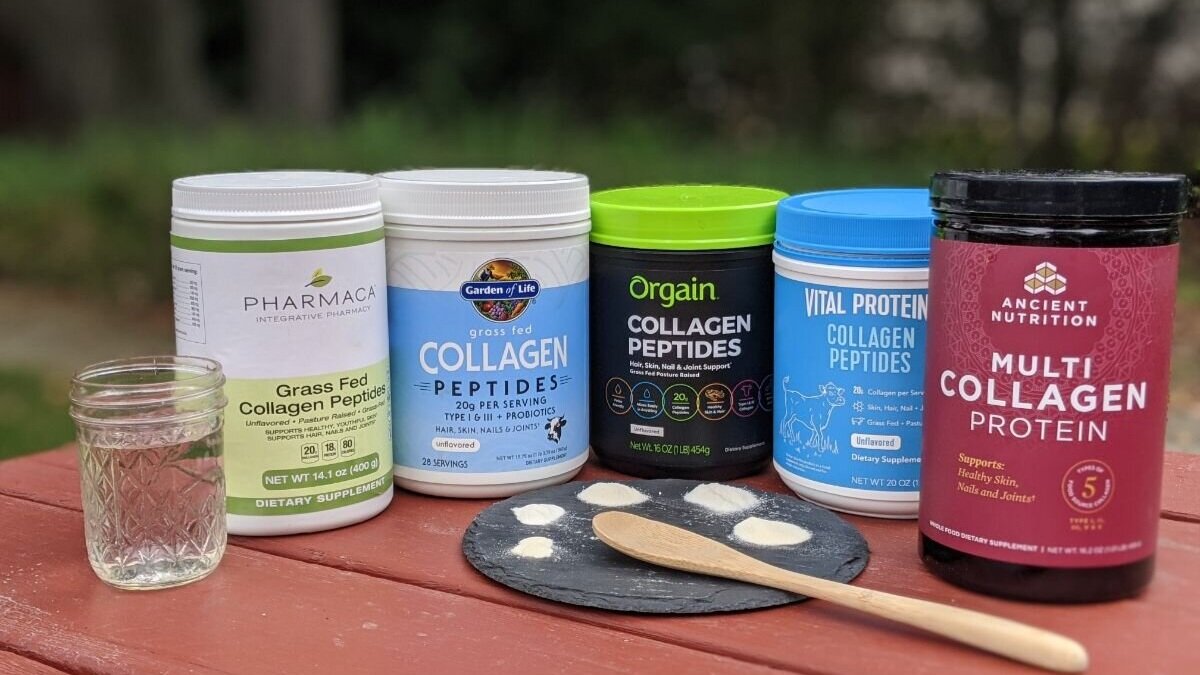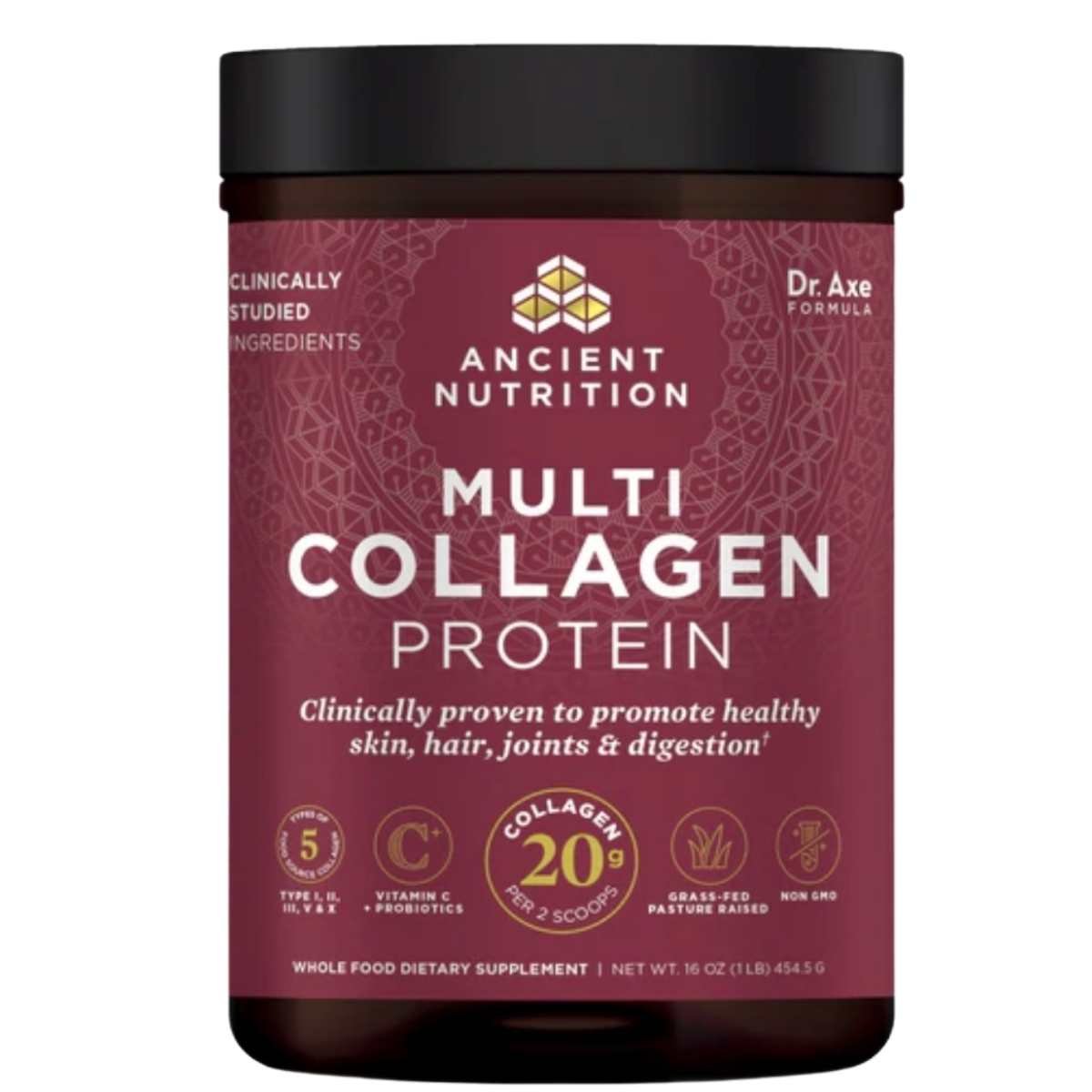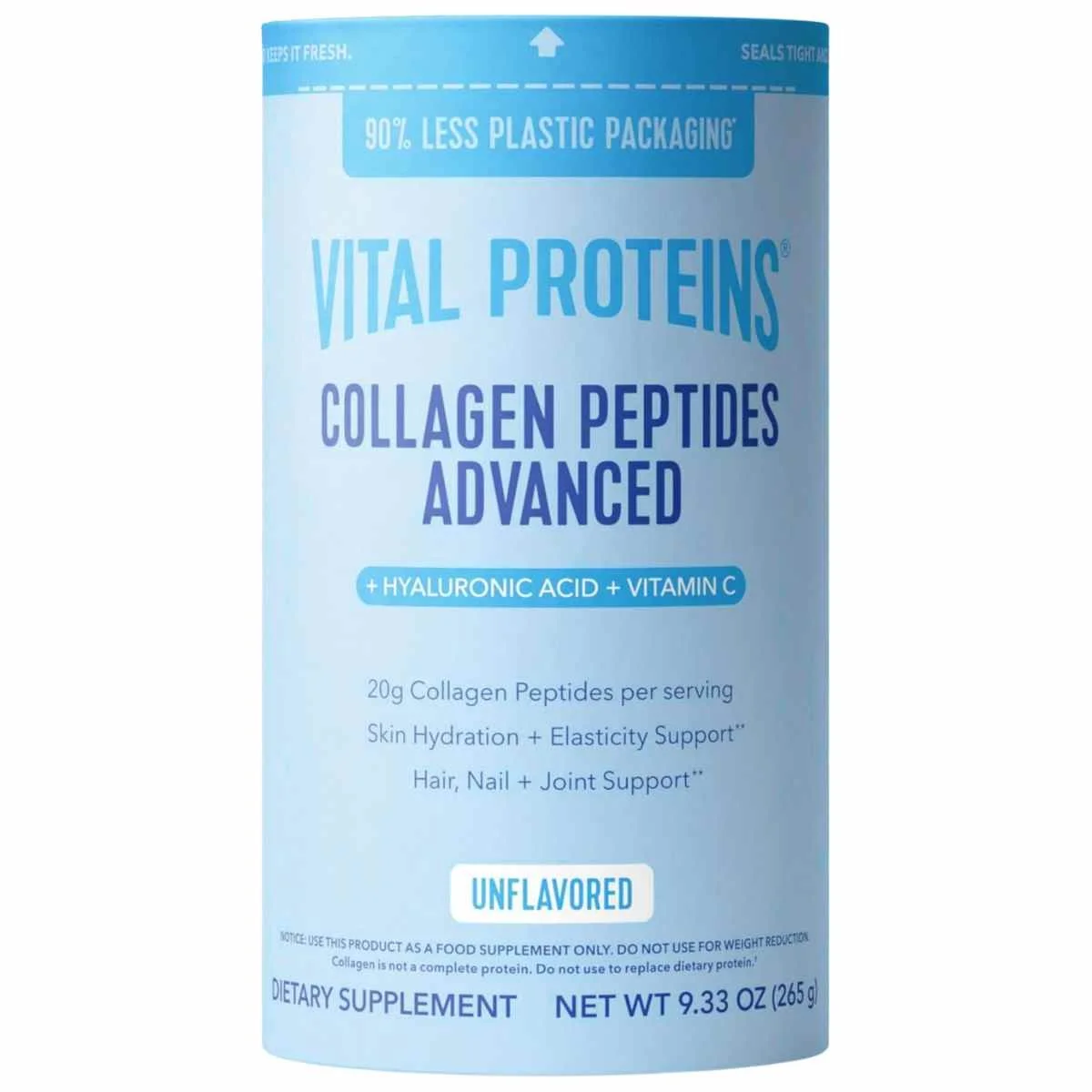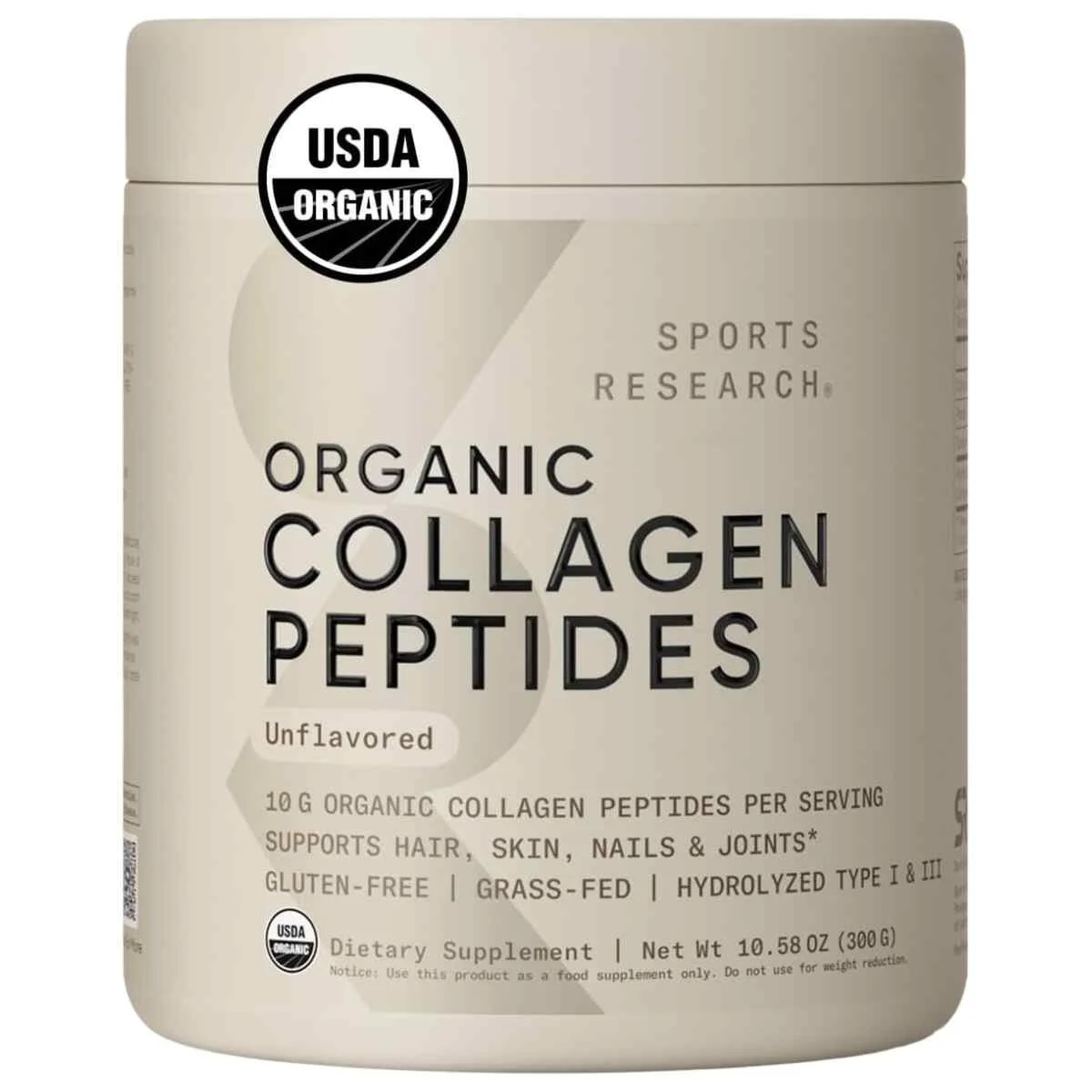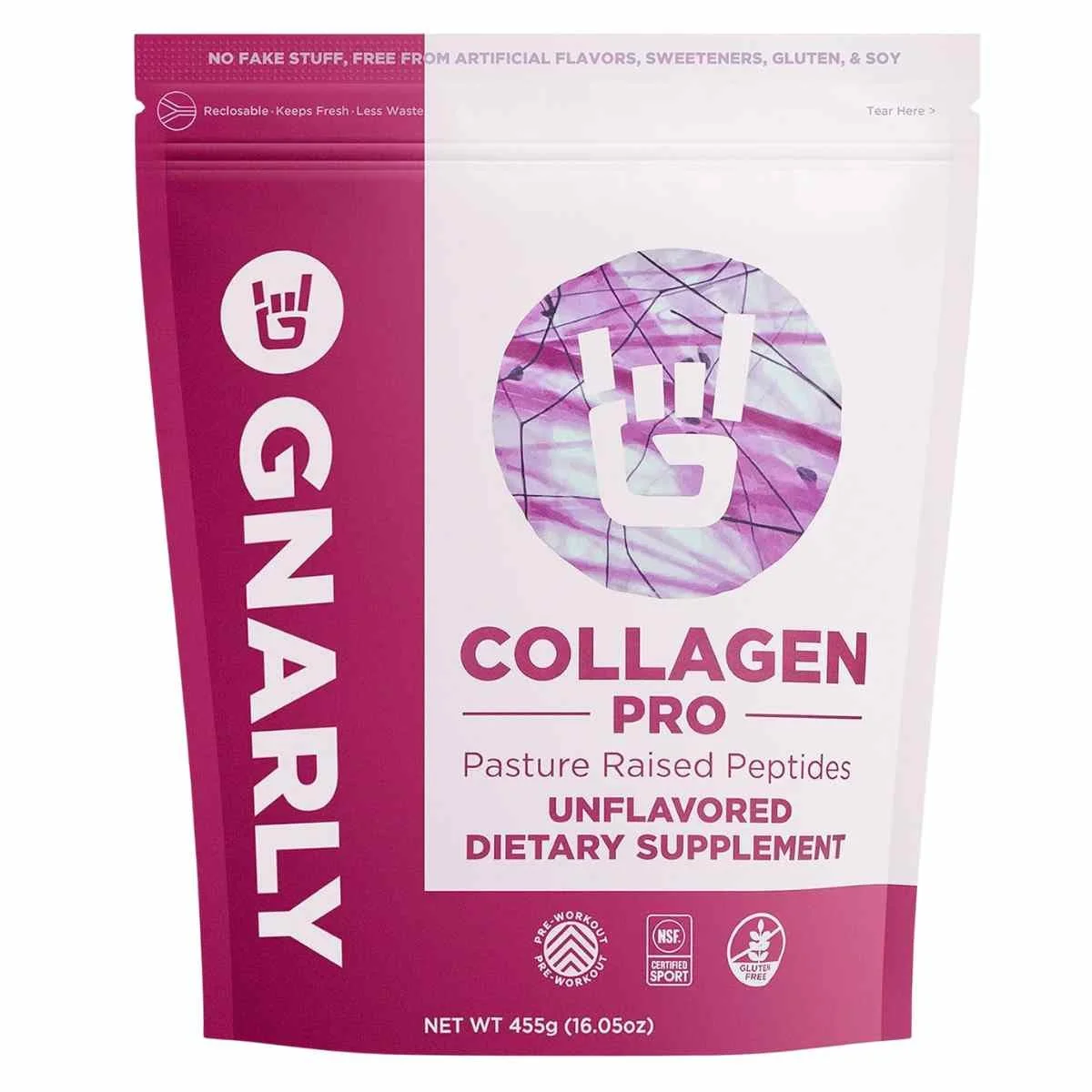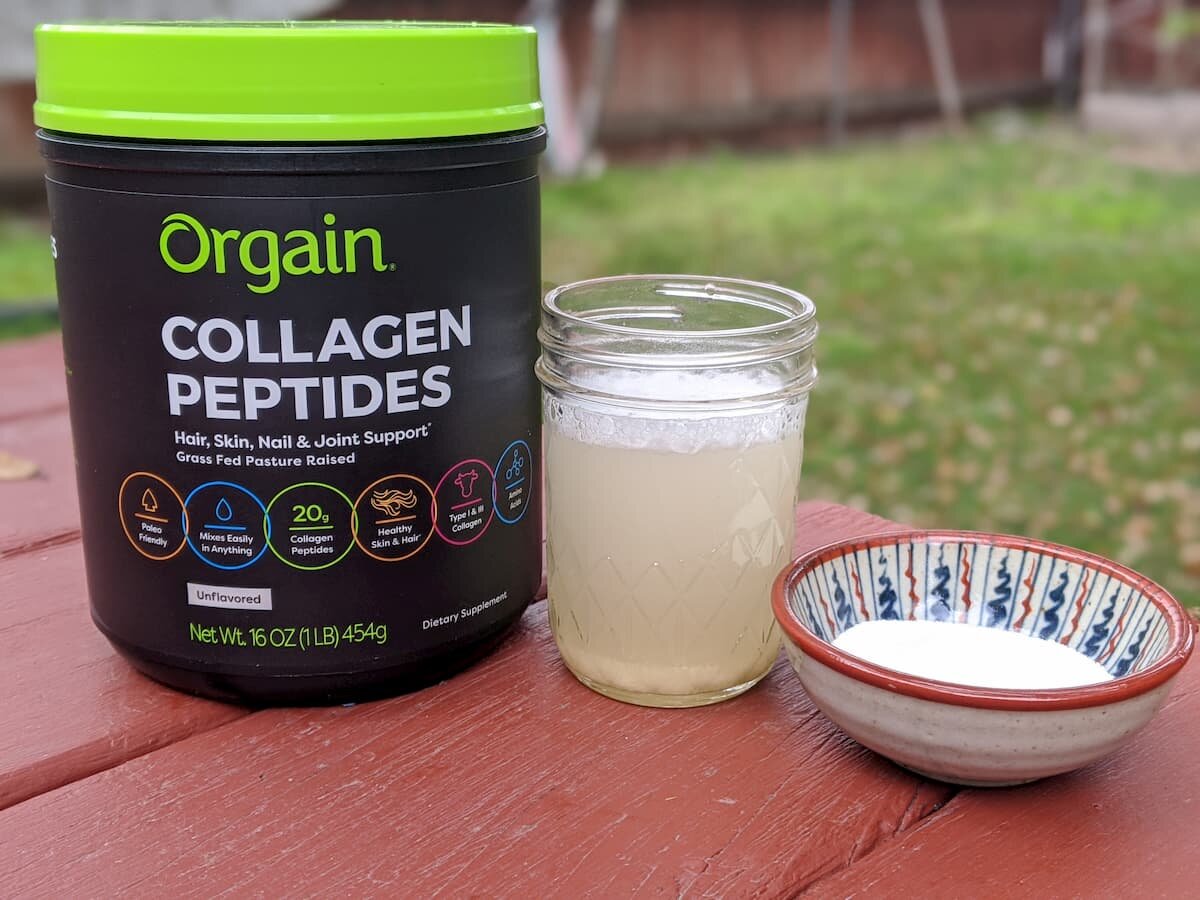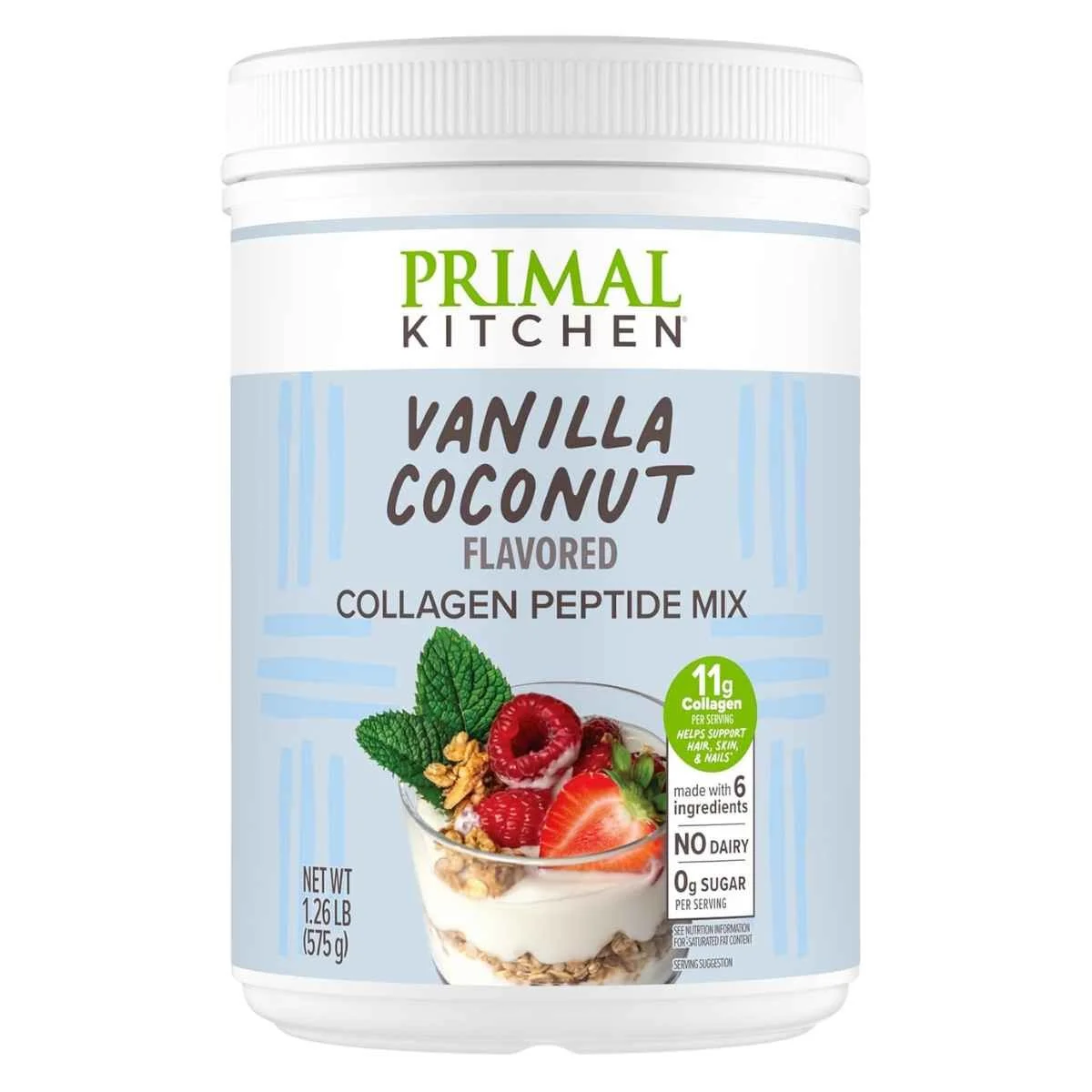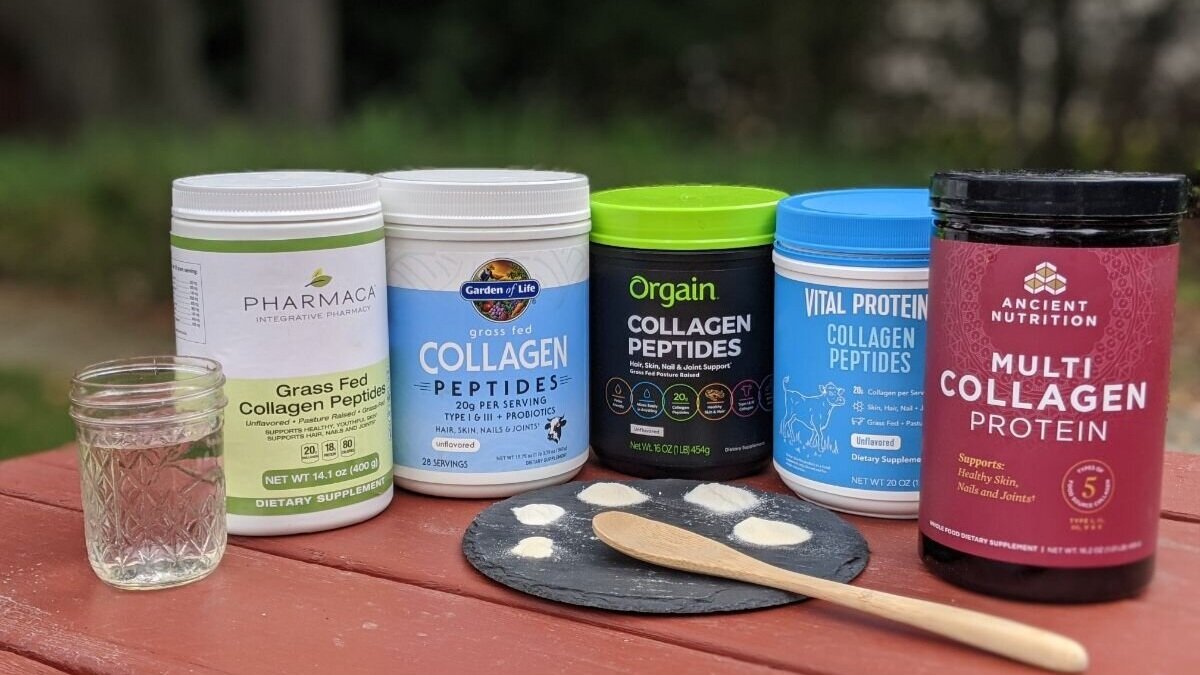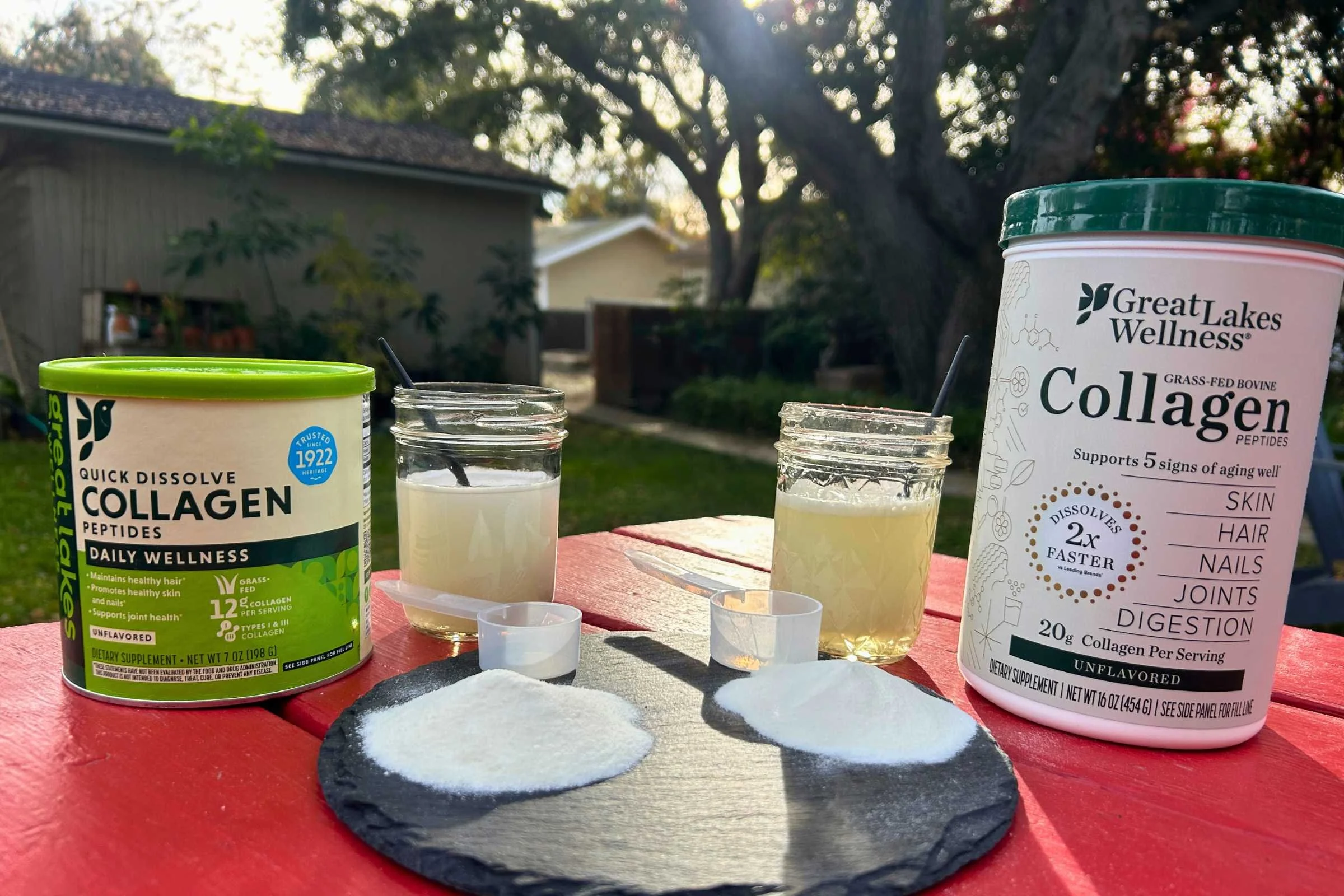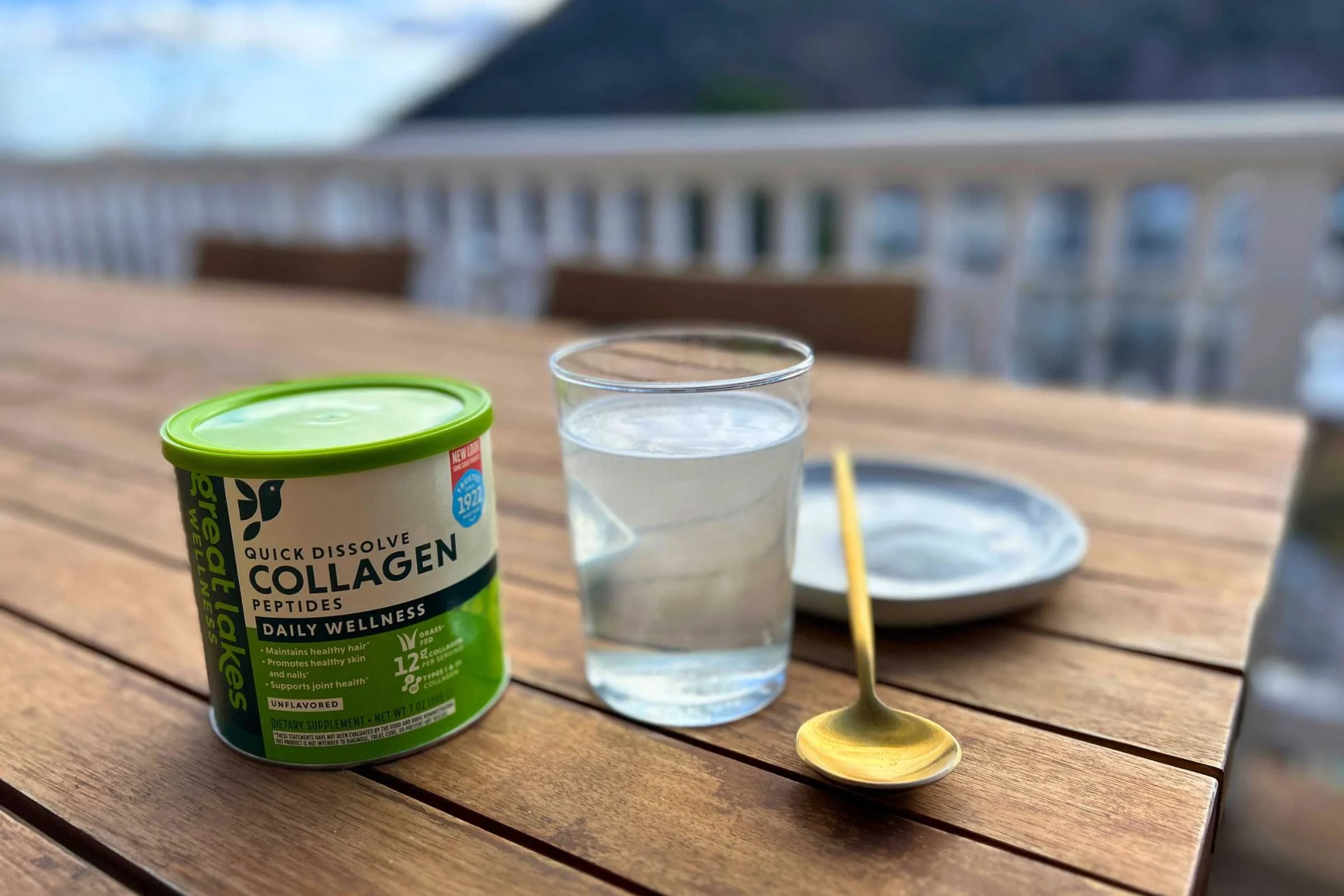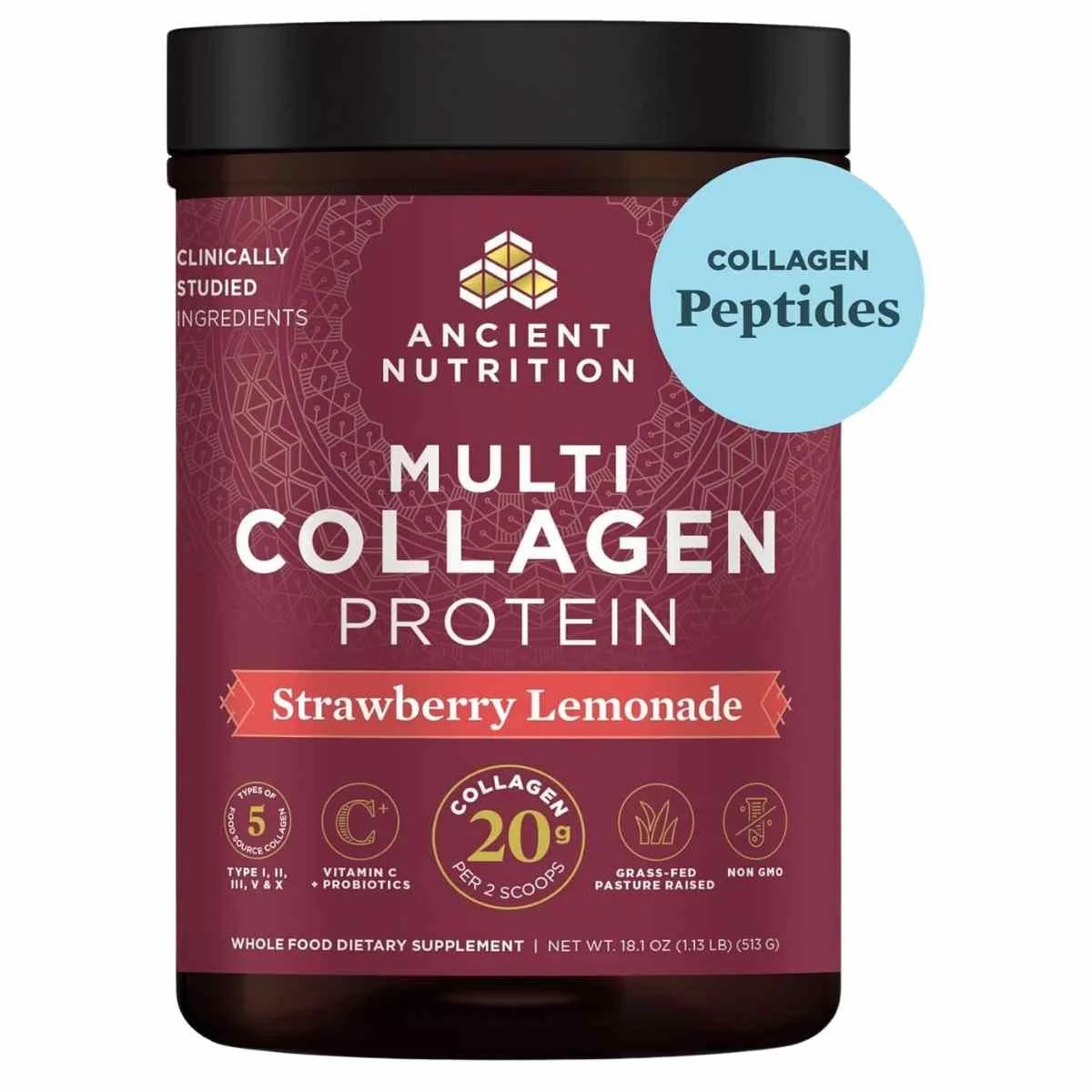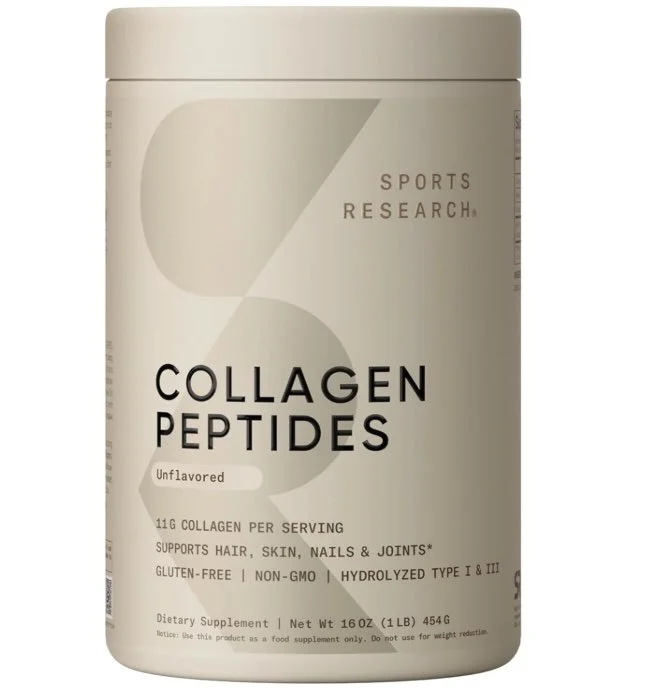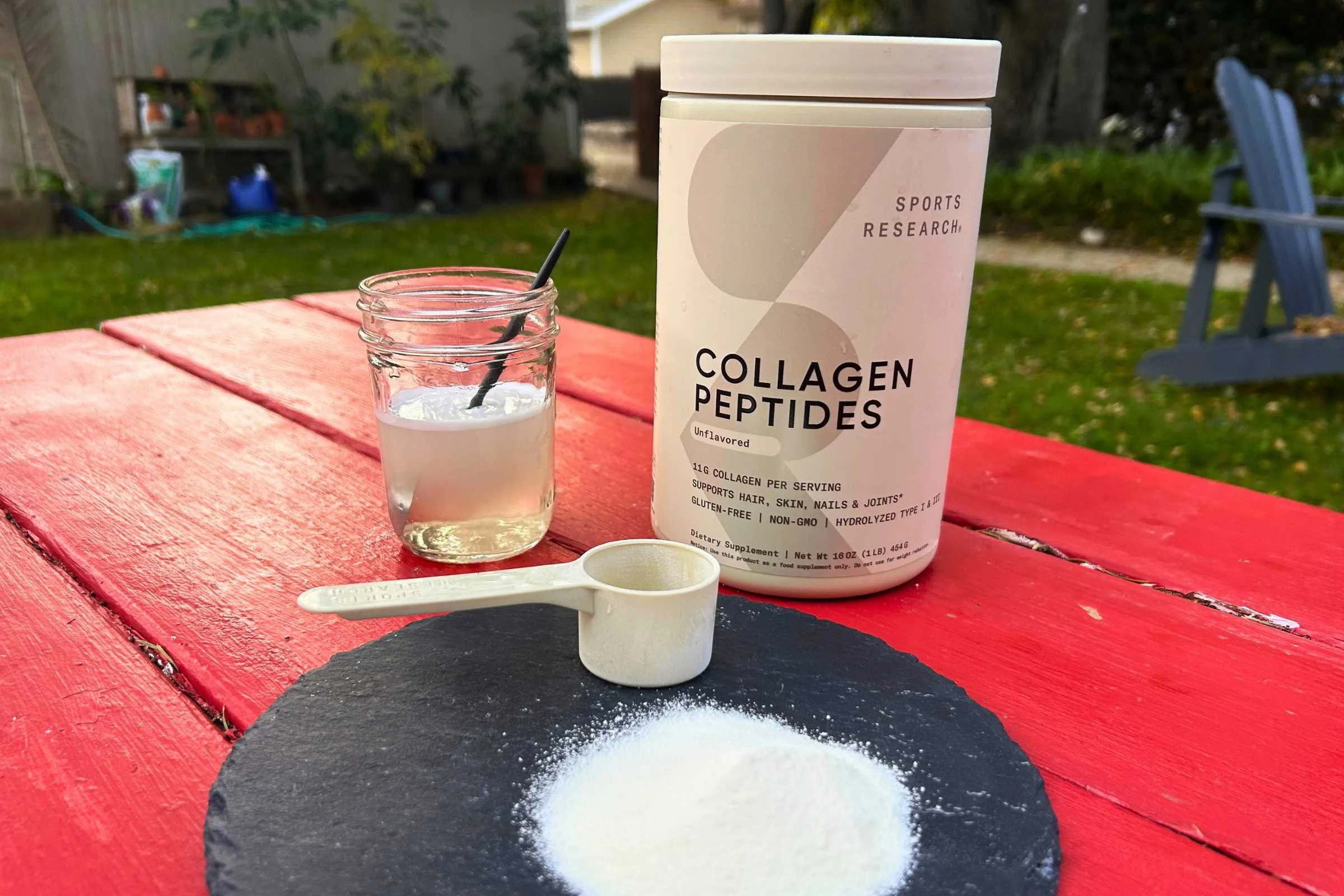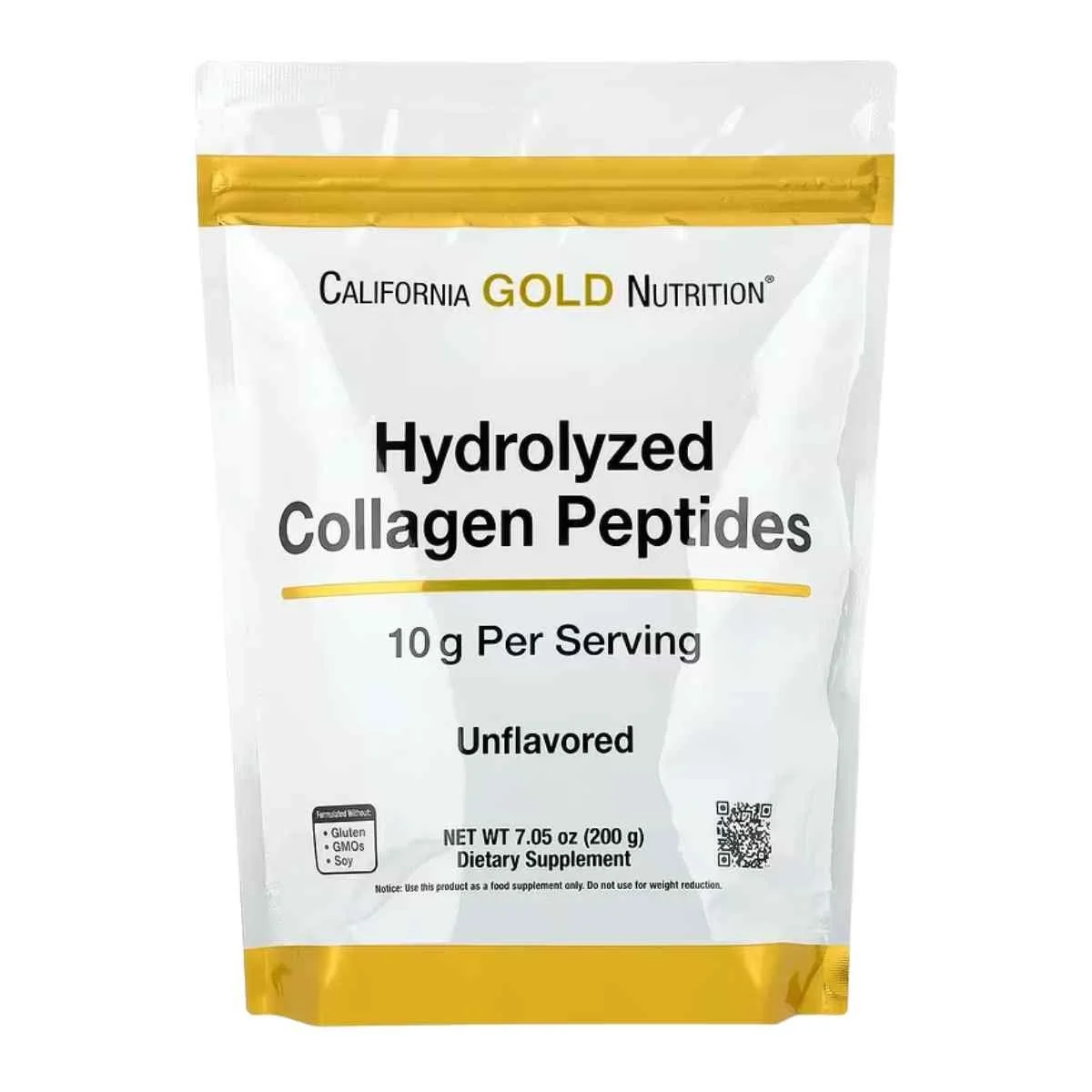Best Collagen Peptides Powder of 2026
The Top Collagen Peptide Supplement Powders for Joint, Gut, and Bone Health
We ran side-by-side comparisons of 14 of the most popular collagen powders to find those that taste good, mix well, and are made with clean, high-quality ingredients.
January 24th, 2026, updated with a new organic winner, three new powders tested, new info on packaging, updated buying advice, and how we tested section
Home > Gear Reviews > Fitness & Nutrition
Collagen powders are more than a health-food trend — for outdoor athletes and active people, they can support joint strength, skin resilience, and connective-tissue recovery without sacrificing convenience. The best collagen supplements mix cleanly, taste decent, and give you quality ingredients whether you're stirring them into coffee, smoothies, or backpacking meals.
We selected over a dozen of the most popular collagen powders and put 22 of them through blind taste- and mixability-tests. Then we compared their sourcing (grass-fed, wild-caught, or pasture-raised), ingredient list, price per gram of collagen, and how they performed in real-world use — from post-hike recovery shakes to everyday nutrition routines for runners, climbers, and backpackers.
In our evaluation we focused on a few key factors: how well the powder dissolves in hot and cold liquids, the flavor and aftertaste, the types of collagen provided (I, II, III, etc.), ingredient quality, and value for money. We also weighed extras like added nutrients, container sizes, and how convenient each powder is for athletes on the go.
Top Pick: The Ancient Nutrition Multi-Collagen Protein Powder rises to the top. With ten types of collagen, pasture-raised sourcing, solid mixability, and a clean flavor profile — plus a reasonable price per gram — it hits the sweet spot for joint, skin, and gut support. For most people wanting a reliable, versatile collagen powder, this one delivers.
We write mission-driven gear reviews. To find the best gear, we combine expert reviews, everyday user opinions, and rigorous trail testing of gear independently chosen by our editors. We are reader-supported and may make a small commission from some qualifying affiliate links at no additional cost to you. Learn more.
Collagen Peptides Comparison Table
| COLLAGEN POWDER | TREELINE AWARD | PRICE PER GRAM* | COLLAGEN TYPES | GRASS-FED OR NON-GMO? | PASTURE RAISED? | PILL OR POWDER? | FLAVOR | MIXABILITY | ADDITIVES | PACKAGING |
|---|---|---|---|---|---|---|---|---|---|---|
| Ancient Nutrition Multi Collagen Protein | Best Overall Read review |
$0.12 | I, II, III, IV, V, VII, VIII, X, XII, XXII | Grass-fed | Yes | Powder | 8/10 | 9/10 | Vitamin C, probiotics | Plastic, scoop included |
| Vital Proteins Collagen Peptides Powder | Best for Skin and Nails Read review |
$0.11 | I, III | Grass-fed | No | Powder | 7/10 | 10/10 | Hyaluronic acid, Vitamin C | Paperboard, no scoop |
| Sports Research Collagen Peptides -Collagen | Best Organic | $0.11 | I, III | Grass-fed, non-GMO | Not stated | Powder | 9/10 | 9/10 | None | Plastic, scoop included |
| Further Food Premium Marine Collagen | Best Marine Read review |
$0.18 | I, II, III | Wild caught | N/A | Powder | 9/10 | 5/10 | Sodium | Plastic + paperboard, scoop included |
| Healthy Origins UC-II Premium Collagen | Best Pill/ Best for Joint Health Read review |
$0.69 | II | Non-GMO | No | Pill | N/A | N/A | – | Plastic, no scoop needed |
* Prices reflect MSRP and are subject to change. We note any discounts we see on our Deals page, which is updated daily.
Prices also reflect approximate price per gram of product. When product has non-collagen ingredients, we also estimate the price per gram of collagen only.
The Best Collagen Peptides Powder
Best Collagen peptide Powder: Ancient Nutrition Multi Collagen Protein Powder
Price per gram: $0.12
Types of Collagen: I, II, III, IV, V, VII, VIII, X, XII, XXII
Grass-fed? Yes
Pasture-raised? Yes
Non-GMO? Yes
Solubility: Cold and hot
Flavor: 8/10
Mixability: 9/10
What we liked: great balance of price, flavor, mixability, and types of collagen, grass-fed and pasture-raised, sold in large tubs
What we didn’t like: not suitable for those avoiding chicken, fish, or egg
Ancient Nutrition Multi Collagen Protein powder is our overall best collagen peptide powder. It’s called “multi-collagen” because it contains ten types of collagen, including all five main types of collagen (types I, II, III, IV, and V) plus additional types of collagen. This means that it comes with the benefits of all those types of collagen, including joint health, skin health, and gut repair.
To get all five types of collagen, Ancient Nutrition contains chicken, fish, eggshell, and bovine collagen. In contrast, the Vital Proteins collagen supplement, our former overall winner, which has only Type 1 & II and only contains bovine collagen. It contains 20g collagen per 2 scoops.
Compare Prices Of The Ancient Peptides Collagen Peptides
The Ancient Nutrition collagen supplement checked all the boxes for a good collagen powder: it dissolved fairly well in 6 ounces of cool water with just a few bits left once stirred. The taste was fairly “clean” compare to other collagen powders with only a slightly noticeable aftertaste. It was one of the collagen powders we thought was actually drinkable alone without being blended into a smoothie or oatmeal. It also scored high points for mixability.
The Ancient Nutrition collagen powder has a lot in common with our Best for Skin and Nails winner, the Vital Proteins Collagen Peptide. Both have similar prices and both sourced from sustainably raised animals. Like Vital Proteins, Ancient Nutrition Multi-Collagen Powder dissolved well in hot and cold liquids, though the Vital Proteins did a slightly better job of completely mixing in cold water.
Ancient Nutrition Multi-Collagen Collagen peptide powder was selected as Best for Gut Health by Very Well Health as well as being a bestseller on Amazon. Reviewers who commented positively noted glowing skin, stronger nails, and reduced cravings.
In a previous version of this guide, we found customer reviews complaining about how a formula change impacted the flavor. Despite the popularity of this collagen powder and our own positive personal experience with the product, we previously chose the Vital Proteins as the top winner for this reason.
The new version of this story reflects that the newest formula change to address this issue. In our own testing, we found the taste to be clean compared to other collagen powders. Additionally, customer reviews seem to reflect positive feedback for the change in flavor.
In our most recent round of testing, Ancient Nutrition scored 8/10 from our testers, even higher than the Vital Proteins.
Best Collagen Peptides for skin and nails: Vital Proteins Original Collagen Peptides
Price per gram: $0.11
Types of collagen: I and III
Grass-fed? Yes
Pasture-raised? No
Non-GMO? No
Solubility: Hot and Cold
Flavor: 7/10
Mixability: 10/10
What we liked: excellent solubility, price, new packaging is the most eco-friendly and has 90% less plastic
What we didn’t like: doesn’t contain Type II collagen
We chose Vital Proteins Collagen Peptides as the Best Collagen for Skin and Nails due to its very reasonable price point, its good solubility, and its neutral taste. It is made entirely of Collagen Types I & III, which are best for skin and nails. Of the Type I & III-only collagen powders, it had the best balance of price, flavor, and mixability.
Vital Proteins was selected as our Best for Skin and Nails Collagen product due to its accolades by several professional reviewers, the numerous positive Amazon reviews, and our own positive testing and long-term experience with the product. Vital Proteins was also named Best Collagen Powder by Very Well Health.
In a previous version of this guide, the Vital Proteins Collagen Peptides were our overall winner. While we still like the Vital Proteins, given that it is Type I & III collagen, we think it is best for people who want collagen peptides primarily for skin, hair, and nails.
Updated for 2026, the Vital Proteins Collagen Peptides updated their packaging to use 90% less plastic. The new packaging is made of at least 80% paperboard from Forest Stewardship Council (FSC) certified sustainable forests.
Compare Prices Of The Vital Proteins Collagen Peptides Powder
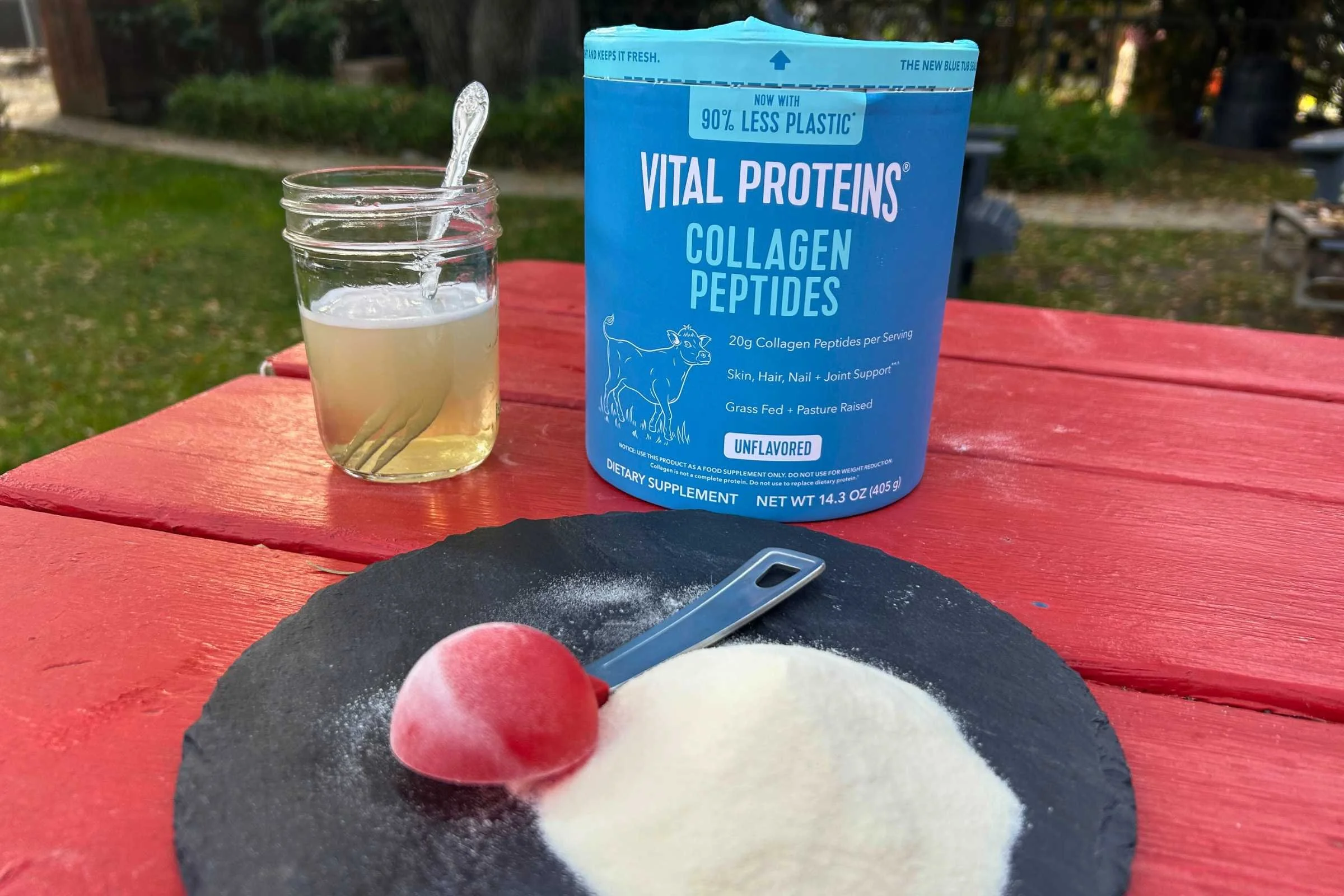
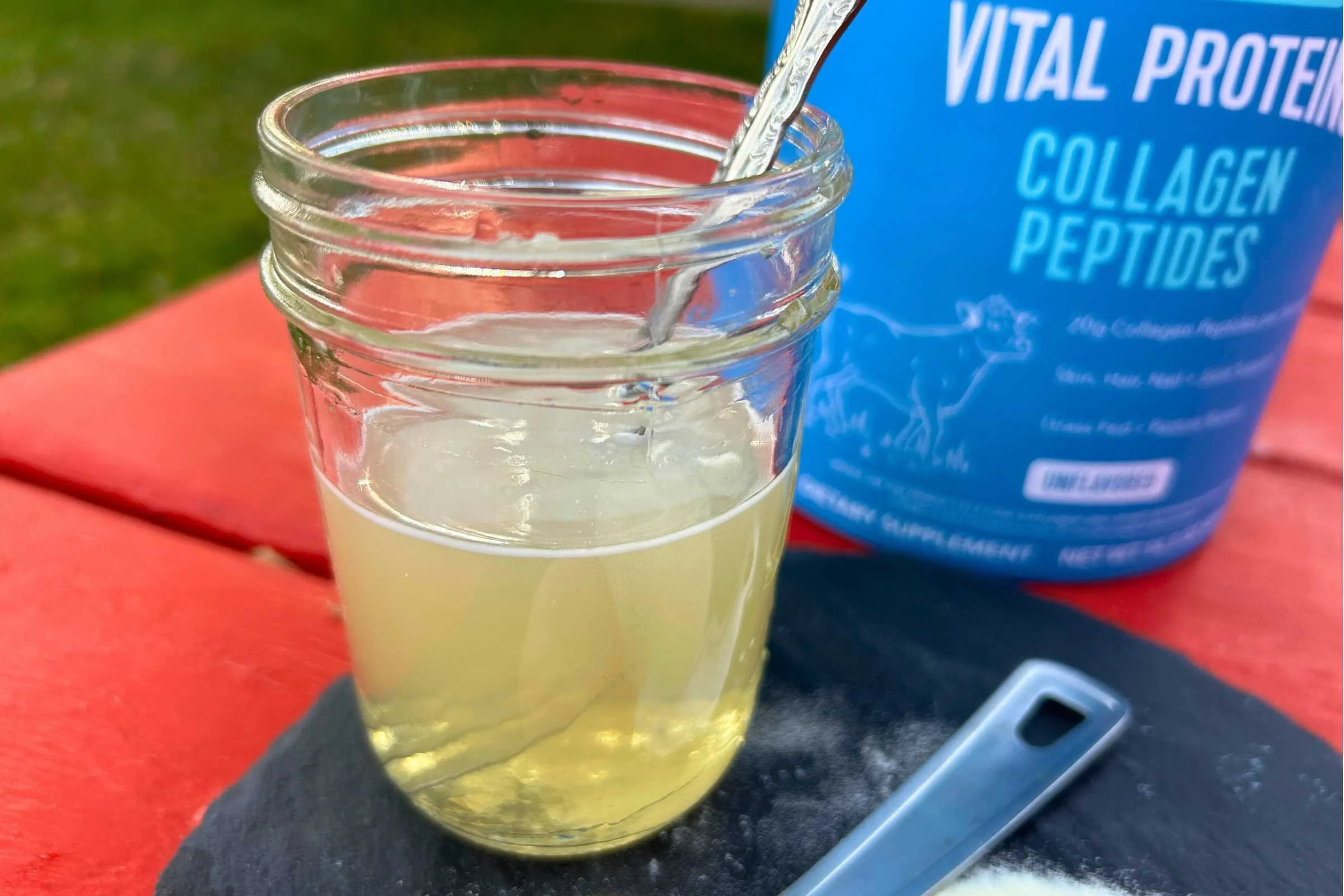
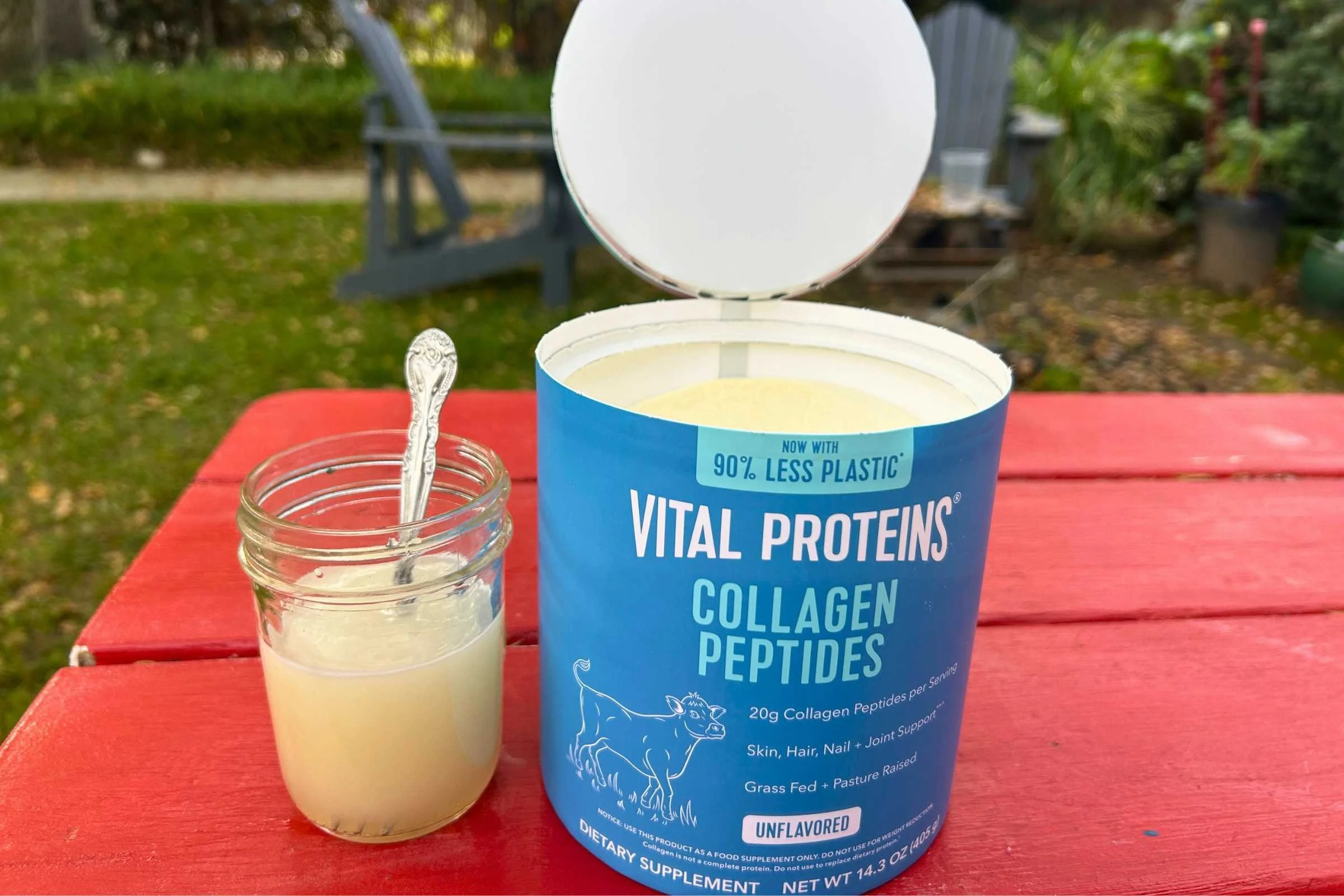
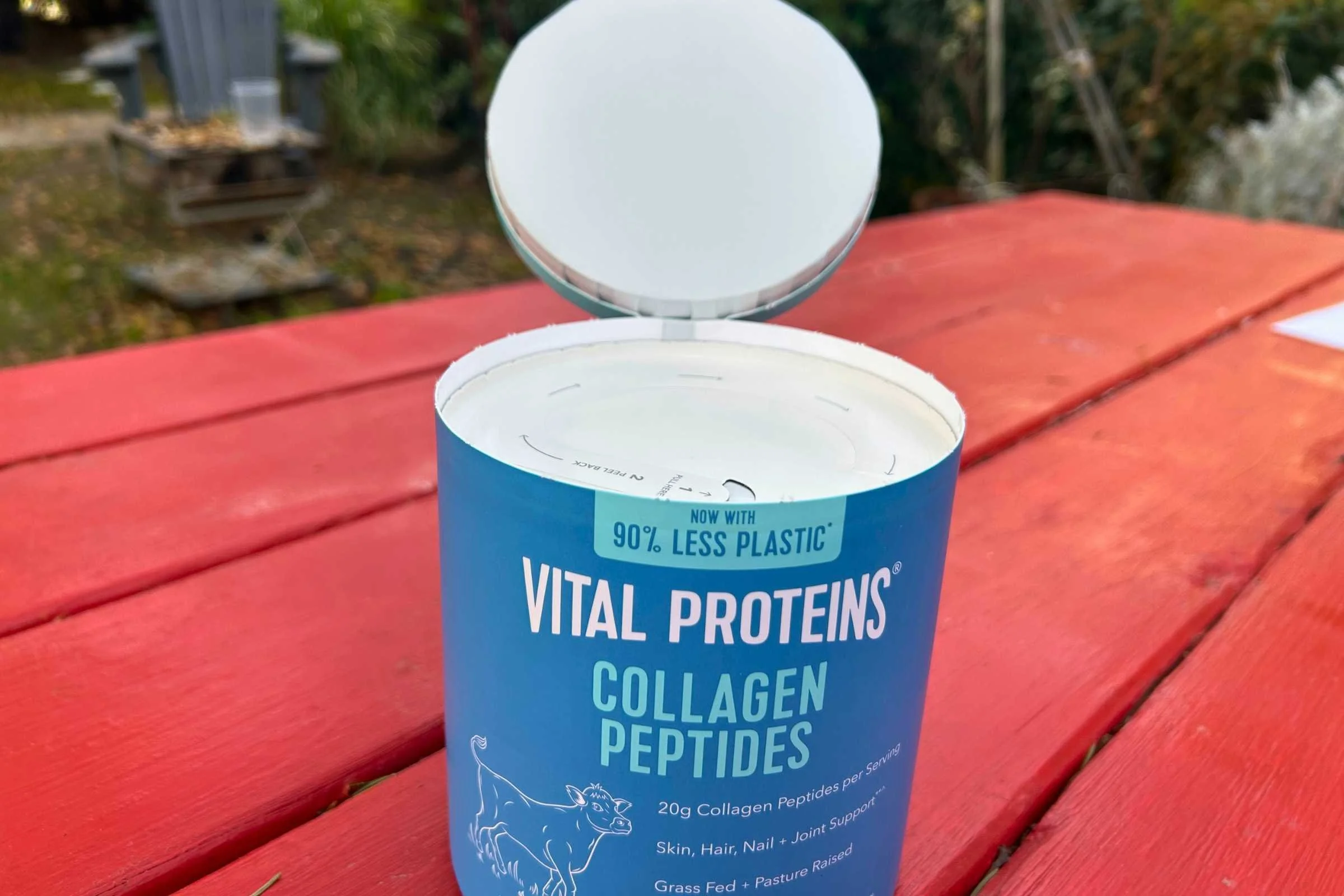
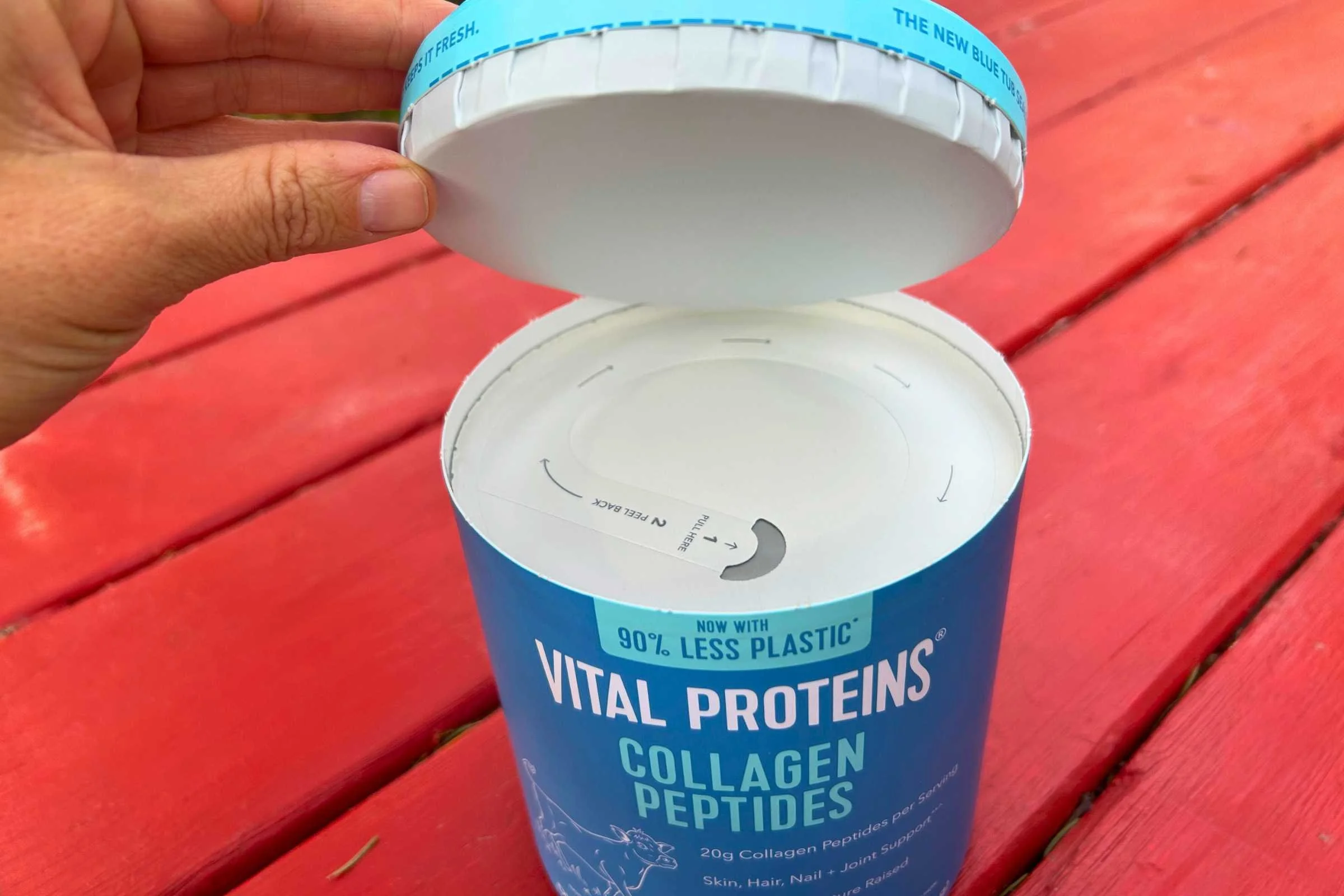
Compared to our other contenders, Vital Proteins Collagen Peptides checked all our ‘must-have’ features while coming in at an affordable price: two scoops (one serving) dissolved well in 6 oz of cool water and had a smooth texture with the best mix-ability of any powder we tested.
In our blind taste tests, testers noted that this collagen peptide had a slightly noticeable bone broth flavor. It scored an average of 8/10 on flavor, with some testers liking it better than others. While it wasn’t the top winner for flavor, it did well.
Another thing we liked about the Vital Proteins is that it comes in multiple sizes, including single-serving packets that make it easy to consume in the outdoors, like on backpacking trips. If you’re looking for travel-size packets, Vital Proteins offers a 20-count box of single-serving packets.
In our tests, the new for 2026 paperboard packaging is sturdy and water-resistant. It is also less spill-prone than Mylar bags that are also sometimes used for more eco-friendly packaging for collagen powder. The pull tab takes a few seconds to figure out but is intuitive.
Vital Proteins estimates it will save 1800 metric tons of plastic annually. Paper packaging weighs less than plastic so requires less fuel for shipping, too. Vital Proteins worked with a third-party to conduct a life cycle assessment (LCA) and found the new packaging has more than 40% less carbon emissions compared to 2025's plastic packaging.
Like many brands, they also removed the plastic scoops. A serving size is now 4 tablespoons.
It’s an Amazon bestseller and Amazon Choice product, an accolade given for their most popular products in a category that is affordable and has a low return rate. These products are also shipped by Amazon themselves, instead of third parties, so are more reliable and trusted.
Amazon reviewers stated that Vital Proteins collagen peptide eliminated joint pain, significantly reduced wrinkles, strengthened brittle nails, increased hair growth, supported better sleep, and even reduced hot flashes.
Best Organic Collagen Powder: Sports Research Organic Collagen Peptides
Price per gram: $0.11
Types of collagen: I and III
Grass-fed? No
Pasture-raised? No
Non-GMO? Yes
Solubility: 9/10
Flavor: 9/10
Mixability: 9/10
Sports Research Organic Collagen Peptides are the world's first organic collagen peptides.
If you're interested in organic collagen peptides, we think this is well worth checking out. Not only is it USDA Organic certified, but the taste and solubility was impressive.
Like the non-organic version we tested, it has an Informed Choice certification and is third party tested. It has a very mild taste and was quite quick to dissolve in cold water.
Sports Research Organic Collagen Peptides
Sports Research says that "For years, Collagen Peptides could not be classified as organic because of how it's processed. But we at Sports Research have cracked the code, thanks to a new gelatin-free bio-extraction and purification process." The brand also says this process uses 70% less water and 60% less energy than traditional collagen peptide extraction methods.
Sports Research uses bovine collagen sourced from organic cattle from Brazil. We appreciate the brand's transparency of where the collagen is sourced.
From the user's perspective, the main difference between the Sports Research Organic Collagen Peptides and the Collagen Peptides non-organic version, as far as we can tell, is the scoop size. The non-organic version has 11 g of collagen per serving whereas the organic version has 10 g of collagen per serving. The non-organic version is also available in 1 lb containers (454 g) whereas the organic version is available in 300 g containers for the same price. We'd expect the organic version to cost more per gram, so that isn't a surprise.
Best Marine Collagen: Further Food Premium Marine Collagen Peptides
Price per gram: $0.18
Types of collagen: I, II, III
Grass fed? Wild-caught
Solubility: Hot and cold
Taste: 9/10
Mixability: 5/10
What we liked: taste, wild-caught
What we didn’t like: solubility
For pescatarians, or those who wish to avoid chicken and bovine collagen, Further Food offers high-quality marine collagen with their Premium Marine Collagen Peptides.
We selected the Further Food collagen powder as our top winner for marine collagen because this collagen powder contains types I, II, and III, is sourced from wild-caught fish, has good solubility for a fish collagen, and tastes good. Best yet, this collagen supplement comes in at an affordable $0.18 per gram.
Further Food’s Collagen received great reviews on Amazon, and Very Well Health selected it as Best Marine Collagen.
Compare Prices Of The Further Food Premium Marine Collagen
Further Food Marine Peptides had a frothy, almost latte-like texture. Photo by Liz Thomas
Noted as one of Amazon’s best sellers for marine collagen, reviewers spoke very highly of Further Foods. Of interest to the active outdoors person, one reviewer noted that this product “helped with inflammation and workout recovery.” Another reviewer noted improvements in skin hydration, reduction in fine lines, improved digestion, and “glamorous” hair and nail growth.
Negative reviews mostly touched on a fishy taste, but this seemed to be present in “bad batches” as opposed to it being an issue across the board.
Our own blind taste tests of multiple reviewers actually found this collagen to be among the best tasting with a slight frothiness almost like a latte. We found that when mixed with 6 oz of room temperature water and a fork, there were still some small clumps at the bottom, so you may prefer to mix this in a blender or into oatmeal or a smoothie. Further Food appears to be very responsive in responding to customer concerns and with resolving complaints.
One thing to note is that the size of a container of the Further Food is smaller than other collagen powders (6.5 oz vs. the 10 or 20 oz containers of Vital Proteins). However, it has the same amount of servings per container—28. A serving scoop on the Further Food is 6.6 g vs. a serving of Vital Proteins is 20 g. The typical dosage for collagen powder is 1 to 9 grams per day, so Further Food is well within the spectrum. More collagen doesn’t always mean better since quality impacts absorption levels.
Best Joint Collagen & Best Chicken-based Collagen & Best Collagen Pills: Healthy Origins Uc-Ii Premium Collagen
Price per gram: $0.69
Types of collagen: II
Pasture-raised? No
Non-GMO? Yes
What we liked: easy to take, price (relative to other pills), chicken only (no bovine), taste and solubility are not concerns for pills, one of few companies making Type II only collagen
What we didn’t like: price
Healthy Origins is our top winner for both Best Joint Collagen Supplement, Best Chicken-based Collagen Supplement, and Best Collagen Pill. As we covered above, Type II collagen primarily comes from chickens and is mostly noted for its benefits for joint health. Healthy Origins was selected as the top choice for joints by Very Well Health and is one of Amazon’s top sellers in this category.
We selected Healthy Origins as our top winner in these categories because it’s one of the only companies we found that specializes in Type II collagen, which has been shown to have the best benefits for joints. This product comes in pill form, so solubility and taste are not concerns.
View The Healthy Origins Uc-Ii Premium Collagen Pills
Amazon reviewers positively reviewed this product for the reduction in joint pain it produced in a short amount of time. One reviewer noted that his months-long sciatica pain disappeared in three days. Another noted that his knee pain was gone after a week of use. Others commented on improvements in knee and shoulder pain. One negative review stated that the bottle did not come with the advertised amount of pills. Other reviewers, however, stated that this wasn’t an issue.
It seems that there aren’t many companies making solely Type II collagen products, which makes Healthy Origins a great option for the active outdoors person who is specifically concerned with healthy joint function.
Our main concern with Healthy Origins is the same for all collagen pills: they are most expensive per gram of collagen than powder form. Additionally, each serving in a collagen capsule gives you less than a gram of collagen compared to the 20 g per serving found in the Vital Proteins.
Still, collagen pills offer convenience over powders. They’re less messy and don’t come with concerns about clumping or poor flavor. They’re easier than powder to carry and store when traveling or on outdoor trips. We think Healthy Origins pills are the best choice if you’re looking for Type II collagen and prefer the convenience of pills.
Best Collagen for athletes: Gnarly Nutrition Collagen Pro
Price per gram: $0.11
Types of collagen: I and III
Grass-fed? Yes
Pasture-raised? Yes
Non-GMO? Yes
Solubility: Hot and cold (although hot can impact the Vitamin C which may reduce the efficacy of the Collagen Pro)
Taste: 8/10
Mixability: 10/10
What we liked: includes Vitamin C and zinc to increase absorption rates of collagen, reasonable price, metal recyclable container, excellent mixability with no clumps
What we didn’t like: Vitamin C adds a flavor that some testers found acrid
Gnarly Collagen Pro is our winner for Best Collagen for Athletes like runners, backpackers, climbers, or any athletes who participate in load-bearing sports. Gnarly Collagen Pro is a collagen powder specifically designed for joint and connective tissue, which are areas of significance for recovery for runners, hikers, and climbers.
It’s the only collagen we tested out of dozens that has added zinc, copper, and Vitamin C, which help with absorption rates (see more below). We also like that Gnarly Collagen Pro comes in single serving sticks for easy transport to races, trailheads, the crag, backpacking, and thru-hiking trips — making it the most convenient way to ensure collagen makes it into the diet.
Compare prices of the Gnarly Nutrition Collagen Pro
Athletes in particular are sensitive to injuries in the joints and ligaments as the body’s collagen production decreases with age. Athletes who may not be as interested in the skin and beauty benefits may seek collagen for recovery and injury prevention.
In addition to 15 g of collagen, one serving contains copper, 15 mg of zinc and 100% of the daily recommended dose of Vitamin C, which it calls “collagen kickstarters.”
Studies show Vitamin C increases collagen production and collagen strength. Zinc and copper have been shown to help with collagen protection and synthesis. You can sometimes get these from taking a supplementary electrolyte powder during exercise, but for athletes on the go, it’s nice to have it all come together in one powder.
In our blind tests, Gnarly Collagen Pro scored high on mixability—among the best of any collagen we tested. It dissolved easily in hot and cold water with no clumps.
It scored 8/10 on taste, though testers think the Vitamin C, copper, and zinc added some flavor.
Gnarly Collagen Pro is one of the few collagen powders we tested whose contents are third-party certified to be free of contaminants. It holds NSF Certification as well as NSF Certified Sport.
Gnarly specifically recommends using Collagen Pro as a pre-workout supplement taken 30-60 minutes before exercise or physical therapy. The increased blood flow from exercise can distribute amino acids and collagen to collagen peptides to joints. These areas usually don’t get a lot of blood flow when we’re sedentary, but do get blood flow during exercise.
Gnarly Collagen Pro is made from 100% grass-fed, pasture-raised cattle from both the U.S. and Brazil.
As far as packaging goes, Gnarly Pro was our favorite. It’s the only collagen powder that comes in a aluminum metal can, so the packaging is completely recyclable. In contrast, most collagen powders come in High Density Polyethylene (HDPE) #2 plastic bins with Polypropylene (PP) #5 lids. Not all municipalities recycle #2 and even fewer recycle #5 plastics, but almost all recycle aluminum.
Additionally, Gnarly Pro is available in single serving sticks, which are convenient for taking on outdoor trips, for races, or during travel.
Best Budget Collagen Powder: Orgain Hydrolyzed Collagen Peptide Protein Powder
Price per gram: $0.08
Types of collagen: I and III
Grass-fed? Yes
Pasture-raised? Yes
Non-GMO? Yes
Solubility: Hot and cold
Average Flavor: 7/10
Average Mixability: 6/10
What we liked: value for price, grass-fed, pasture-raised, non-GMO
What we didn’t like: not as mixable as other collagens we tested
Orgain is one of the biggest brands in collagen and protein powder and was one of the most affordable options we considered. We like that the Orgain Hydrolyzed Collagen Peptides are grass-fed and contain Type I and III collagen, similar to our Winner for Best for Skin and Nails, Vital Proteins (see full review above). At $0.08 per gram, it’s one of the least expensive collagen powders we tested. We were impressed that despite its affordable price, it is made of grass-fed, non-GMO, and pasture-raised ingredients.
Compare Prices Of The Orgain Collagen Peptides
The Orgain powder is affordable, but doesn’t dissolve as well as other powders. Note the clumps at the bottom of the glass.
Orgain has collagen peptides available as a stand-alone product or as a Keto version, which also contains MCT oil (see full review below). In a blind taste test, we couldn’t get the Orgain Hydrolyzed collagen powder to dissolve completely in 6 ounces of cool water — even when stirred vigorously. It performed last among the powders we tested for clumpiness. This collagen peptide powder also had a noticeable collagen/bone broth taste but was still drinkable alone, which wasn’t always a given for the peptides we tried.
Best Tasting Collagen - Vanilla: Primal Kitchen Vanilla Coconut Collagen
Price per gram: $0.10 ($0.14 collagen-only)
Types of collagen: Types I, III
Grass-fed? Not stated
Pasture-raised? Not stated
Non-GMO? Yes
Solubility: Cold and hot
Flavor: none
Mixability: 7/10
After numerous reader questions about the best tasting collagen powder, we decided to add a new category to our 2025 best collagen guide. Of all the collagen powders we tested, the Primal Kitchen Vanilla Coconut Collagen is the best tasting collagen.
View the Primal Kitchen Vanilla Coconut Collagen
The Primal Kitchen Vanilla Collagen tastes the most like a vanilla milkshake. Unlike other collagen creamers we tested that can get lumpy or taste more like a powdered non-dairy creamer you'd get at a gas station, the Primal Kitchen Vanilla Collagen is silky smooth and satisfying. It doesn't need the coffee to feel like a worthy beverage. Its delicious as a standalone drink and mixes with hot and cold water.
Like many flavored collagen powders, the Primal Kitchen Vanilla Coconut Collagen may fit more into the "collagen creamer" category. Its ingredients include coconut milk powder, monk fruit extract, konjac root gum, vanilla flavor, and sea salt. Like all flavored collagen powder, part of what you're paying for isn't collagen at all. We calculated about 73% of the product is collagen powder. It also could've been better at mixing.
And we don't care about those flaws. Because it tastes that good.
Best Tasting Collagen - Fruit: Garden Of Life Multi-Sourced Collagen With Turmeric
We like the taste of the Garden of Life Collagen, but it’s expensive per gram of collagen. The tub is also much smaller than most collagen (Nuun tube next to the tub for size comparison).
Price per gram: $0.13
Types of collagen: I, II, and III
Grass-fed? Yes
Pasture-raised? Yes
Non-GMO? Yes
Solubility: Hot and cold
Average Flavor: 9/10
Average Mixability: 5/10
We've been testing the Garden of Life Multi-sourced Collagen with Turmeric for years and keep coming back to it year after year for its excellent flavor.
After numerous reader questions about the best tasting collagen powder, we decided to add a new category to our 2025 best collagen guide. The Garden of Life Multi-sourced Collagen with Turmeric is our winner for best flavored collagen for powders with a fruit flavor.
This Garden of Life collagen contains Collagen Types I, II, III, as well as probiotics and turmeric, which has been shown to have anti-inflammatory properties.
All our taste testers liked the apple cinnamon flavor of this product after they finished exercise or in the middle of a backpacking trip. However, some testers didn't like the stevia sweetener when using it as a daily supplement at home. Still, we found this flavored collagen to be more palate-pleasing than other "fruity" flavors we tested, including those by Ancient Nutrition.
At 11 cents per gram, that makes it one of the pricier collagen powders. It's worth noting that although a container contains 220 grams, only 200 grams of each package are collagen. So taking that into account, it is 12 cents per gram of collagen.
Compare Prices Of The Garden Of Life Collagen With Turmeric
Some contenders we tested side by side with our top winner. Note the difference in texture and color of the powders. Photo by Liz Thomas.
other collagen powders we tested
To find the best collagen peptides, we researched over a dozen of the most popular products available and then tested the most promising ones. Here are some of the products we considered.
Price per gram: $0.07
Types of collagen: I and III
Grass-fed? Yes
Pasture-raised? Yes
Non-GMO? Yes
Solubility: Hot and cold
Flavor: 6/10
Mixability: 5/10
Although the Garden of Life Grass-Fed collagen peptides was a bestseller and Amazon Choice product, we didn’t see many third-party reviews of it (including Lab Door testing), so didn’t include it in our initial testing pool.
In our most recent testing round update, we ran side-by-side blind taste tests of the Garden of Life Collagen Peptides against other collagen powders. We found that the Garden of Life collagen remained clumpy when mixed into 6 ounces of cool water. We noticed it had a slight tart/acrid taste.
We could drink it alone if needed, but we thought the flavor would be better mixed with oatmeal or a smoothie. The texture was fairly smooth, with just a few lumps. User reviews on Amazon also note clumps, lumpiness, and a noticeable fishiness/beefy taste.
Compare Prices Of The Garden Of Life Collagen Peptides
Orgain Keto (bottom center) has a thicker texture than the other collagen powders we tested. Notice the difference in the grain size between the Vital Proteins (left), Garden of Life Turmeric (right), and Ancient Nutrition Bone Broth (top).
Price per gram: $0.10
Types of collagen: I and III
Grass-fed? Yes
Pasture-raised? Not stated
Non-GMO? Yes
Solubility: Hot and cold
Average Flavor: 6/10
Average Mixability: 6/10
In addition to trying the Orgain Collagen Protein Powder, we also tested the Orgain Keto Collagen Protein Powder in vanilla. This was one of two flavored collagen protein supplements we tested. The MCT oil made this collagen protein much creamier than other powders we tested, which we thought enhanced the texture and made it almost like a milkshake.
However, the vanilla flavor we tested also had a noticeable stevia sweetness. Most of our testers thought was cloying and artificial tasting, but some people may enjoy the dessert-yness. The Orgain Keto Collagen Protein powder is also available in chocolate, which we have not taste-tested.
Compare prices of the Orgain Keto Collagen Protein Powder
Price per gram: $0.09 per gram
Types of collagen: I and III
Grass-fed? Yes
Non-GMO? Yes
Solubility: Hot and cold
Average Flavor: 6/10
Average Mixability: 6/10
Great Lakes Collagen Peptides nearly made it into our top winners. It’s relatively affordable, comes in a variety of sizes, and comes from grass-fed sources. This collagen supplement has great reviews and was selected by Very Well Health as a top overall collagen. It’s also one of the most affordable collagen powders available.
They've recently changed their packaging again and we tested samples from both types of packaging. The newest version has the finest grain and whitest of the powders we tested. The collagen powder in the older packaging appeared much grainier. The fine powder more easily made a mess.
The newer version also dissolves better with minimal clumping. However, the taste is more bitter with some filmy residue at the bottom of the cup that we didn't see in the older version.
Compare prices of the Great Lakes Wellness Collagen Peptides
Price per gram: $0.09 per gram
Types of collagen: I, II, III
Grass-fed? Not stated
Non-GMO? Not stated
Solubility: N/A (pills)
Flavor: N/A (pills)
Mixability: N/A (pills)
We researched Youtheory Collagen Pills but ultimately didn’t find enough credible reviews of the product to take it to the testing phase or to recommend.
Compare prices of the Youtheory Collagen Plus Biotin
The NeoCell Super Collagen powder had a flavor with a bitter after taste. In cold water, it formed lumps at the bottom of the glass (as seen here). In hot water, it dissolved quickly.
Price per gram: $0.06
Types of collagen: I, III
Grass-fed? Yes
Pasture-raised? Not stated
Non-GMO? Yes
Solubility: Cold and hot
Flavor: 6/10
Mixability: 8/10
The NeoCell Super Collagen Peptides are a best-selling collagen powder with collagen types 1 and 3, similar to our winner for Best Collagen for Skin and Hair. It shows up on many lists due to its affordability, is similar in price to Orgain, and is often available on sale.
We found the NeoCell to be great at dissolving, mixing well in cold and extremely well in hot water. However, in blind taste tests, all our testers found the flavor to have a bitter aftertaste. It's not noticeable when mixed in a smoothie or oatmeal. We still think it's a good option, especially if you want a more affordable Type I and III collagen option.
View the NeoCell Super Collagen Peptides
Price per gram: $0.08
Types of collagen: I, III
Grass-fed? Yes
Pasture-raised? Yes
Non-GMO? Yes
Solubility: Cold and hot
Flavor: 6/10
Mixability: 8/10
Bubs Naturals Collagen Peptides are a highly-rated collagen protein. We found it worked well at mixing and had a subtle but noticeable flavor. While middle-of-the-road in price, you can occasionally find Bubs Natural on sale for great deals for as low as $0.04 per gram. We liked the mixability of the Bubs Natural better than the Orgain, our Budget winner. If you find the Bubs Naturals at $0.04 per gram, we think it offers a lot of quality for a good price.
View the Bubs naturals Collagen Peptides
Price per gram: $0.13
Types of collagen: I, II, and III
Grass-fed? Yes
Pasture-raised? Yes
Non-GMO? Yes
Solubility: Cold
Flavor: 9/10
Mixability: 8/10
We’re currently testing the Sparkle Collagen Skin Boost Plus, which also contains Vitamin C and hyaluronic acid. Sparkle Collagen uses Verisol collagen — a proprietary collagen from Gelita.
At $0.13 per gram, it’s on the expensive side of what we tested, but the thousands of positive reviews on Amazon convinced us to test it (we’re skeptical that the high price tag is worth it).
The flavored versions are tasty — our tester especially likes the orange flavor!
View the Sparkle Collagen Skin Boost Plus
Price per gram: $0.14 ($0.18 collagen-only)
Types of collagen: Not stated
Grass-fed? Yes
Pasture-raised? Yes
Non-GMO? Yes
Solubility: cold and hot (works better hot)
Flavor: bone broth, garlic
Mixability: 5/10
The pure encapsulations PureDefense Collagen with Bone Broth powder was one of the flavored options we considered. Unlike many of the flavored collagen powders out there, this one is flavored with natural bone broth, black garlic, mushrooms, yeast, and vegetables instead of "natural flavors" and sweeteners like Stevia. The result is an earthy, meaty broth. Some testers liked the hearty flavors. Other testers found the aged fermented black garlic to give it an undesirable odor.
The PureDefense Collagen is among the most expensive we tested at $0.13 per gram including collagen, bone broth, and the vegetables, mushroom, and other flavorings. We estimated the cost per gram of collagen to be $0.18 per gram (and even then, the labeling isn't quite transparent about whether that is collagen or collagen and other proteins).
View the pure encapsulations PureDefense Collagen
Price per gram: $0.10 ($0.12 per collagen-only)
Types of collagen: Types I, II, III, IV, V, VII, VIII, X, XII, XXII
Grass-fed? Yes
Pasture-raised? Yes
Non-GMO? Yes
Solubility: Cold and hot
Flavor: strawberry lemonade sweetened with Stevia
Mixability: 9/10
The Ancient Nutrition Multi Collagen Strawberry Lemonade takes our overall winner for best collagen powder and adds a strawberry lemonade flavor to make it more palatable to people who do not like collagen. We tested it in our quest to find the best flavored collagen powder with a fruit flavor. However, we found the flavoring to be off. It's sweetened with Stevia that comes across too strong. It's also pink, colored by beet juice.
View the Ancient Nutrition Multi Collagen Strawberry Lemonade
Price per gram: $0.09 ($0.11 for collagen-only)
Types of collagen: Type I, III
Grass-fed? Yes
Pasture-raised? Yes
Non-GMO? Yes
Solubility: Cold and hot
Flavor: slight vanilla, slight fruity
Mixability: 5/10
The Orgain Collagen Peptides Superfoods powder takes the Orgain Collagen that is our winner for best budget collagen and mixes it with a Superfoods blend. The result is a slight vanilla, fruity flavor. The main ingredients in the Superfoods Blend are millet, amaranth, and apple pulp. These starchy ingredients give it a thicker consistency that is somewhere between collagen powder and protein powder that makes mixing challenging.
View the Orgain Collagen Peptides Superfoods
Price per gram: $0.07
Types of collagen: I and III
Grass-fed? No
Pasture-raised? No
Non-GMO? Yes
Solubility: 9/10
Flavor: 9/10
Mixability: 9/10
Sports Research Collagen Peptides (the not organic version) has an Informed Choice certification and is third party tested. It has a very mild taste and was quite quick to dissolve in cold water. While it had some of the largest grains of all the powders we tested, it dissolved faster than even extremely fine grain powders.
The Sports Research Collagen may have been a winner. However, it is made from bovine collagen and there is no claim that the cows were grass-fed or pasture-raised. For the price, we can find collagen powders with similar good flavor and solubility that uses grass-fed and pasture-raised collagen. The brand sells an Organic version, which won our award for best organic collagen and it is the only organic collagen peptides we've seen.
Sports Research is a product of Korea with bovine collagen sourced from the USA, New Zealand, and/or Australia. We appreciate the brand's transparency of where the collagen is sourced.
Sports Research Collagen Peptides
Price per gram: $0.05
Types of collagen: I, III
Grass-fed? Not stated
Pasture-raised? Not stated
Non-GMO? Yes
Solubility: 5/10
Flavor: 7/10
Mixability: 5/10
The California Gold Nutrition Hydrolyzed Collagen Peptides powder was the most affordable collagen powder we tested. It is the in-house brand of supplement retailer iHerb. As would be expected for the price, the collagen is not grass-fed or pasture-raised. The solubility and mixability wasn't as good as other collagen powders. It had visible stringy chunks at the bottom that didn't dissolve in cold water, even with a lot of stirring. After finishing a glass of collagen powder, there was residue that stuck to the edges of the cup. Flavor-wise, it was noticeable but not bad.
California Gold Nutrition Hydrolyzed Collagen Peptides
From top center: Garden of Life Turmeric Collagen Peptides, Ancient Nutrition Bone Broth, Orgain Keto Vanilla, Vital Proteins Collagen Peptides. Photo by Liz Thomas
What is Collagen?
Collagen is the main structural protein in the various connective tissues in the body. It’s made up of 19 different amino acids and is the most abundant protein in mammals, accounting for 25% to 35% of the whole-body protein content. Collagen is found in tendons, ligaments, bones, skin, corneas, blood vessels, the intestinal barrier, intervertebral discs, teeth, and muscle tissue. Therefore, having enough collagen in the body is essential to good health.
It’s important to note that endogenous collagen production slows after age 35. In addition to natural collagen loss that occurs with aging, the body's collagen level can decrease with ultraviolet light exposure, tobacco use, and excessive sugar intake.
The word collagen actually comes from the Greek word kólla, meaning "glue", and suffix -gen, meaning "producing," which refers to the old process of boiling the skin and tendons of horses and other animals to obtain glue. In a sense, collagen acts like glue for your entire body.
Collagen is necessary for elasticity in the skin, stronger bones, pain-free joints, and a more secure gut lining.
Is collagen good for building muscle?
Although collagen is a protein, it’s not the best source of protein for building muscle. It is low in essential amino acids and branched-chain amino acids, those that help the most with building muscle.
In addition, many protein powders have BCAAs (branched-chain amino acids) that make them ideal for recovery.
Collagen Peptides vs. Gelatin vs. Bone Broth… What’s the Difference?
Collagen peptide powder can be repackaged and used for travel or outdoor pursuits. Here, the author, Katie Gerber, drinks collagen powder while on an backpacking trip. Photo by Katie Gerber
Collagen peptides are a form of collagen produced through the process of hydrolysis. Hydrolysis is a chemical reaction that uses water to rupture chemical bonds. In the case of collagen, this process reduces collagen to small peptides. These peptides are more easily absorbed by the body during collagen supplementation.
Collagen peptides can be ingested as a supplement or as part of food to aid joint and bone health and to enhance skin health. Numerous peer-reviewed studies, including from the National Institute of Health, support the benefits of collagen as an anti-inflammatory and aid to joint and bone health. That is one reason why collagen supplements have become popular for runners and hikers to add to their diet.
Collagen supplements are found in the form of a powder, a capsule, or a tablet. However, we decided to focus on collagen in powder form because it is the most cost-effective way to consume adequate amounts of collagen.
Gelatin vs. collagen
Gelatin and hydrolyzed collagen contain the same amino acids, but different chemical properties. Gelatin is partially hydrolyzed collagen, meaning that it has undergone the process of hydrolysis to the point where the collagen triple helix strands are broken down into individual strands. When gelatin is further hydrolyzed, that’s when it becomes completely hydrolyzed collagen. That means it’s fully broken down to the individual peptides, which are easier for the body to absorb, as discussed above.
Gelatin will only dissolve in hot water and will congeal when cooled.
Hydrolyzed collagen dissolves in hot or cold water and is the most easily absorbed.
Sometimes, you will see hydrolyzed collagen referred to as “hydrolysed collagen." This is the British spelling but refers to the same chemical process.
Bone broth vs. collagen
When it comes to bone broth, it’s common for bone broth and collagen to be thought of as synonymous. However, that’s not quite the case. Bone broth is made by simmering animal bones and connective tissue in water to extract minerals and gelatin. Collagen products, on the other hand, are made by breaking down the hides, skin, tendons, ligaments of animals, and scales of fish, using water and heat to make gelatin, often requiring up to 40 hours of simmering.
Bone broth contains collagen, but in varying quantities, depending on the product and the process of collagen production. That’s one reason we didn’t include bone broth in this story: it’s like comparing apples and oranges because the levels of collagen in bone broths are not equal across products. A collagen peptide supplement will generally have a higher percentage of collagen per gram than products marketed as bone broth.
While the percentage of collagen per gram of collagen peptide powder isn't consistent either, we were able to find exact amounts of collagen peptides per serving. That wasn’t the case for most brands of bone broths. The exception was Ancient Nutrition’s Bone Broth, which has 15 grams per serving.
Many people consume bone broth for its collagen content, but, as indicated by consumerlab.com, amounts of collagen in bone broths are generally not listed on labels. Some products contained nearly 5 times as much collagen as others, with that window generally ranging from 2.5 grams to 11.5 grams. The benefits of collagen, like reduced joint pain and skin wrinkles, are found in research studies based on collagen supplements, not bone broth. While there is some evidence for using bone broth to boost the immune system and improve gut health, it’s preliminary.
Collagen powders vary in their granular texture, which can impact mixability. Photo by Liz Thomas
What to look for in collagen peptides
In order for a collagen supplement to make it onto our contender list, they had to meet the following criteria. We then selected award winners from that list.
Price per gram of collagen
A reasonable price for quality products could be found in the range of $0.05 to $1.15 per gram of collagen. Pro tip: Be careful when reading labels to determine the amount of collagen in a product. You’ll want to check the serving size and the number of servings in the packet, as well as the label for how much of the protein content is actually collagen.
Types of collagen
There are 28 different types of collagen. It’s estimated that 80-90% of collagen in the body is type 1, 2, and 3. The amount of each collagen type varies in each of the body’s tissues.
Type 1 is mostly in bones, ligaments, tendons, and skin.
Type II is primarily in cartilage as well as in smaller amounts in tendons and ligaments.
Type III is always found with type I and is predominantly in the skin, blood vessels, and internal organs.
Therefore, the determining factor in the type of collagen in a product is less about the source animal and more about the part of the animal that’s being used.
While many products claim that certain types of collagen confer specific benefits to the user, many sports nutritionists, including Shannon O’Grady, who we interviewed below, indicate that there’s little research suggesting type-specific benefits, such as type 1 and 3 for skin, or type 2 for joints. The amino acid sequences of the different types of collagen are very similar, and research shows that it’s the amino acids that stimulate collagen synthesis. The existing research that indicates the benefit of a certain type of collagen compares that type to a placebo rather than to another type of collagen.
That being said, the type of collagen is still a popular measure some people use when choosing their collagen powder. Depending on why you’re purchasing this dietary supplement, you may be interested in determining whether it contains the type of collagen that is best for your desired outcome (e.g., if you’re looking for joint health, you may prefer a product has Type II collagen).
Comparison of several brands and types of collagen peptides that are grass fed and pasture raised.
Grass-fed/non gmo/pasture-raised/wild-caught
Treeline is committed to doing what’s right for the environment. To that end, we looked for products from animals that are properly raised, without genetically modified ingredients.
For collagen from cows, we sought grass-fed. For collagen from chickens, we only included pasture-raised. For fish and marine collagen, we only included wild-caught.
Solubility
When you're outdoors, you’re most likely not hauling a Vitamix on your back (though kudos to you if you are). To that end, we selected products that had both hot and cold solubility. That means you can add your supplement to hot or cold water, shake it up, and it mixes in, as opposed to clumping up.
Taste
Reduced joint pain and glowing healthy skin is great and all, but if it doesn’t taste good, you’re probably not going to take it. And if you don’t take it, you’re not going to reap the benefits.
Where does collagen come from?
Collagen can easily be added to granola or other food items.
The body makes collagen by using amino acids, which come from breaking down dietary protein from foods like fish, chicken, beef, eggs, dairy, and beans. The collagen synthesis process also requires vitamin C, zinc, and copper.
Is there vegetarian or vegan collagen powder?
Most collagen supplements on the market are animal-based because collagen protein is only found in animals. Collagen powder supplements contain collagen from the bones, skin, and connective tissues of animals, including cattle, fish, horses, pigs, or rabbits.
An alternative for those who don’t want to consume animal products is vegan collagen builders. These products don’t contain collagen. Rather they contain plant-based ingredients that the body can use to build collagen.
Most scientific research on collagen’s benefit to joints was conducted on gelatin or collagen peptides. However, building blocks like the amino acids glycine, hydroxyproline and proline also promote collagen synthesis. Proline can be found in cabbage and mushrooms. Legumes have glycine.
Examples of vegan collagen boosters that utilize these ingredients are Sunwarrior Collagen Building Protein Peptides and Rae Wellness Collagen Boost.
Some people wish to avoid chicken collagen and bovine products, instead opting for marine collagen, which is made solely from fish collagen, and is, therefore, pescetarian friendly. Nutritionally, it’s quite similar to bovine collagen.
The author adds collagen powder to a healthy breakfast of almond butter and granola.
What to know about supplementing with collagen
-
The typical dose for collagen intake in adults is 1-9 grams per day. For specific directions, follow the dosing suggestion on the product. Check with your doctor before starting any new supplements.
-
Collagen does not cause any adverse reactions in the majority of individuals. Some users may experience digestive issues, rashes, or headaches, but these side effects are mild and uncommon.
-
In general, it's easier to get larger doses of ingestible collagen from powders rather than pills. In our calculations (see our comparison table), collagen in pill form was up to 10 times as expensive per gram than collagen in powder form. Drinking collagen as a powder dissolved in water or other beverages allows you to take a larger dose of collagen in one sitting than most pills. We didn't consider any products marketed as a "collagen drink" as they tend to be more expensive than powders that you prepare yourself.
-
Collagen can be taken any time of day to obtain the benefits. Some people opt to take it on an empty stomach to ensure proteins are broken down by stomach acid. However, some studies show it doesn’t appear that this is necessary. In terms of storage, it’s recommended that collagen products be stored in a cool, dark, dry place.
-
There is some evidence that collagen synthesis requires vitamin C as a cofactor.
Should athletes use collagen supplements?
The author pre-mixes collagen powder with other nutritional supplement powders to create easy on-the-go health smoothies for travel or backcountry adventure. Photo by Katie Gerber.
We sat down with Shannon O’Grady, PhD in Nutritional Physiology who is head of sports nutrition at Gnarly Nutrition. Dr. O’Grady says, “Collagen supplementation makes sense for any active individuals participating in load-bearing sports.” This is because those activities use the musculoskeletal system, which is where the collagen we want to keep healthy is found.
According to O’Grady, the benefit of collagen supplementation that has the most convincing research behind it is the decrease in joint pain, both for people with osteoarthritis and for individuals with athletic-related joint pain, such as backpackers with knee pain. Collagen peptides increase collagen synthesis, and other benefits of supplementation suggested by some studies are that it reduces the risk of injury and supports recovery from injuries.
Because collagen synthesis declines with age, O’Grady tends to recommend it for individuals over 30 years old or individuals who place demands on their joints over what would be normal for a typical 30-year-old. This might include climbers or those with a history of injury to their joints.
In terms of when to take collagen peptides, she said that for it to be effective for joint pain, it’s necessary to consume 5-15 grams, and it’s best taken 45 minutes to an hour before exercise to give the body enough time to digest and assimilate the collagen. Exercise increases blood flow to the joints, which transports more amino acids and peptides to those areas.
When looking for a collagen product, O’Grady recommends finding one that is hydrolyzed (broken down), or that consists of collagen peptides, as this helps with absorption in the body.
She also recommends looking for 3rd party quality certification, such as by the NSF. This means it will be tested for contaminants, that the formula is reviewed for safety, and that the product is tested for label claims so you know that the amount of collagen per serving on the label is what’s actually in the product.
Certain additions, such as copper, zinc, and vitamin C, aren’t absolutely necessary, but they can increase collagen synthesis in the body.
Benefits of collagen peptides
Collagen peptides offer a variety of health benefits, and their popularity has increased due to their positive impact on different aspects of well-being. Here are some key benefits of collagen peptides:
Skin health
Wrinkle reduction: Collagen is a crucial component of the skin, providing structure and elasticity. Collagen peptides can help reduce wrinkles and improve skin hydration, leading to a more youthful appearance.
Increased elasticity: Regular consumption of collagen peptides may enhance skin elasticity, promoting a firmer and smoother texture.
Joint support
Cartilage health: Collagen is a major component of cartilage, the tissue that cushions and supports joints. Collagen peptides can help maintain joint health by supporting the regeneration of cartilage.
Reduced joint pain: Some studies suggest that collagen peptide supplementation may reduce joint pain and discomfort associated with conditions such as osteoarthritis.
Hair and nail strength
Improved hair quality: Collagen is a key component of hair follicles. Collagen peptides may contribute to stronger, more resilient hair, reducing issues like breakage and split ends.
Enhanced nail growth: Collagen peptides can support the growth and strength of nails, reducing brittleness.
Gut health
Intestinal lining support: Collagen helps maintain the integrity of the gut lining. Consuming collagen peptides may support gut health by preventing the passage of harmful substances into the bloodstream.
Aid in digestion: Collagen can promote a healthy digestive system by soothing and supporting the lining of the digestive tract.
Muscle mass and strength
Protein synthesis: Collagen is a protein, and collagen peptides can contribute to overall protein intake. This is essential for muscle protein synthesis, promoting muscle growth and maintenance.
Exercise recovery: Some studies suggest that collagen peptides aid in post-exercise recovery by supporting muscle repair and reducing inflammation.
Bone health
Collagen is a component of bones and contributes to their structure. Collagen peptide supplementation may help maintain bone density, reducing the risk of conditions like osteoporosis.
Weight management
Collagen peptides, being a protein, can contribute to a feeling of fullness, potentially aiding in weight management by reducing overall calorie intake.
It's important to note that individual responses to collagen peptides may vary, and while some people may experience significant benefits, others may not notice as much of an impact. It's always advisable to consult with a healthcare professional before adding supplements to your routine, especially if you have existing health conditions or concerns.
How to incorporate collagen peptides into your routine
Recommended daily dosage
Determining the appropriate daily dosage of collagen peptides can depend on various factors, including individual health goals and the specific type of collagen supplement. However, a common recommendation is to start with 10 to 20 grams per day for noticeable benefits. It's advisable to follow the guidelines provided by the product or consult with a healthcare professional to find the optimal dosage for your needs.
Creative ways to use collagen peptides
Smoothies and shakes: Blend collagen peptides into your morning smoothie or post-workout shake. This is a convenient and tasty way to incorporate the supplement into your routine without altering the flavor significantly.
Coffee or tea: Mix collagen peptides into your morning coffee or tea. The peptides are often flavorless and usually dissolve easily, making it a seamless addition to your favorite beverages.
Soups and stews: Add collagen peptides to soups, stews, or broths. This is an excellent option during colder months and ensures you get your collagen boost without changing the texture of your meals.
Baked goods: Enhance the nutritional content of your homemade muffins, pancakes, or energy bars by adding collagen peptides to the batter. This is a versatile way to incorporate collagen into your diet.
Yogurt or oatmeal: Mix collagen peptides into your yogurt or oatmeal for a nutritious and protein-packed breakfast. This can be particularly beneficial for those who prefer a more traditional approach to their morning meals.
Tips for better absorption and effectiveness
Pair with vitamin C: Vitamin C plays a role in collagen synthesis. Consuming collagen peptides with foods rich in vitamin C, such as citrus fruits or bell peppers, may enhance their effectiveness.
Stay hydrated: Adequate hydration is essential for overall health and can contribute to the effectiveness of collagen peptides. Drink plenty of water throughout the day to support skin hydration and overall well-being.
Consistency is key: To experience the full benefits of collagen peptides, consistency is crucial. Incorporate them into your daily routine, and over time, you may notice improvements in skin health, joint function, and more.
Remember to consult a healthcare professional before making significant changes to your supplement routine, especially if you have any underlying health conditions or concerns.
How we researched and tested
We tested collagen powders side-by-side by sending unlabeled samples to Treeline writers and editors around the country. What was in each bag was only revealed after all the powders had been tested, ranked, and evaluated. Photo by Liz Thomas.
We've spent the last 6 years testing collagen powders side by side, comparing the most popular collagen powders across the factors that matter most: ingredient quality, collagen type and source, third-party testing, additives, flavor options, and cost per gram of collagen.
First, we analyzed each product’s label for sourcing transparency (such as pasture-raised bovine or sustainably caught marine collagen), certifications like NSF Certified for Sport, and whether formulas relied on sweeteners, fillers, or unnecessary extras.
To understand how these powders perform in real life, we evaluated mixability and taste across different liquids, paying close attention to products that dissolved cleanly or left grit behind. We also compared protein content and serving sizes to calculate true cost value—because some products appear affordable until you factor in how much collagen is actually in each scoop. Finally, we cross-checked our findings with reputable medical and nutrition sources to ensure that our guidance on dosage, safety, and potential benefits reflects current research.
We sent unmarked bags to testers across the country and had them report back taste-testing and their experiences mixing in hot and cold water and with smoothies.
Author’s expertise and why you should trust us
The author, Katie Gerber, mixing up a collagen smoothie on a 800-mile trek on the Oregon Desert Trail. Photo courtesy Katie Gerber.
As a certified nutrition coach, a certified herbal medicine educator, and a Yosemite mountain guide, and an outdoor athlete with over 8,000 miles of backpacking experience, finding products that keep me healthy and help me hike farther comfortably is a top priority for me.
I’m the co-author of Adventure Ready: A Hiker’s Guide to Planning, Training, and Resiliency.
I guide my clients through the process of optimizing health so they can fully enjoy the wilderness. I’ve written about health and backpacking for publications such as MindBodyGreen and Treeline Review, in addition to regularly publishing on my own blog. In an effort to support the outdoor community in getting outside with more energy and resilience, I created the Adventure Ready online course and a free masterclass on how to create our unique nutrition plan for the trail.
I, nor anyone in my family, are sponsored or an employee of any of the companies mentioned here. This is unbiased and this review is intended to help you find the best product for the price. Treeline Review doesn’t accept sponsored content, native advertising, or paid reviews.
Beyond the basics of good nutrition, there are certain products that have the potential to be uniquely beneficial to backpackers, and collagen is at the top of that list. I personally find that it benefits my long-distance hiking endeavors so much that I have it every morning on trail in a homemade healthy smoothie mix.
You can see all articles by Katie Gerber on her Treeline Review author page.
Sources
Daneault, A. (2014) Hydrolyzed collagen contributes to osteoblast differentiation in vitro and subsequent bone health in vivo. Osteoarthritis and Cartilage, Volume 22, S131 DOI: https://www.oarsijournal.com/article/S1063-4584(14)00280-5/fulltext
Daneault, A. et al. (2017) Biological effect of hydrolyzed collagen on bone metabolism, Critical Reviews in Food Science and Nutrition, 57:9, 1922-1937, DOI: 10.1080/10408398.2015.1038377
Dar, Q. A. et al. (2017). Daily oral consumption of hydrolyzed type 1 collagen is chondroprotective and anti-inflammatory in murine posttraumatic osteoarthritis. PloS one, 12(4), e0174705. https://doi.org/10.1371/journal.pone.0174705
Carlos Pastor-Pareja, J., Tian Xu. (2011) Shaping Cells and Organs in Drosophilia by Opposing Roles of Fat-Body Secreted Collage IV and Perlecan. Development Cell. 21(2), 245-256. DOI: https://doi.org/10.1016/j.devcel.2011.06.026
Kumar, S, et al. (2014) A double-blind, placebo-controlled, randomised, clinical study on the effectiveness of collagen peptide on osteoarthritis. J Sci Food Agric. 2015 Mar 15;95(4):702-7. doi: 10.1002/jsfa.6752. Epub 2014 Jun 24. PMID: 24852756. https://pubmed.ncbi.nlm.nih.gov/24852756/
Tezze, Caterina et al. (2017) Age-Associated Loss of OPA1 in Muscle Impacts Muscle Mass, Metabolic Homeostasis, Systemic Inflammation, and Epithelial Senescence. Cell Metabolism, 25(6), 1374 - 1389.e6 DOI: https://doi.org/10.1016/j.cmet.2017.04.021
Trindade, R., Albrektsson, T., Tengvall, P. and Wennerberg, A. (2016), Foreign Body Reaction to Biomaterials. Clinical Implant Dentistry and Related Research, 18: 192-203. doi: 10.1111/cid.12274

